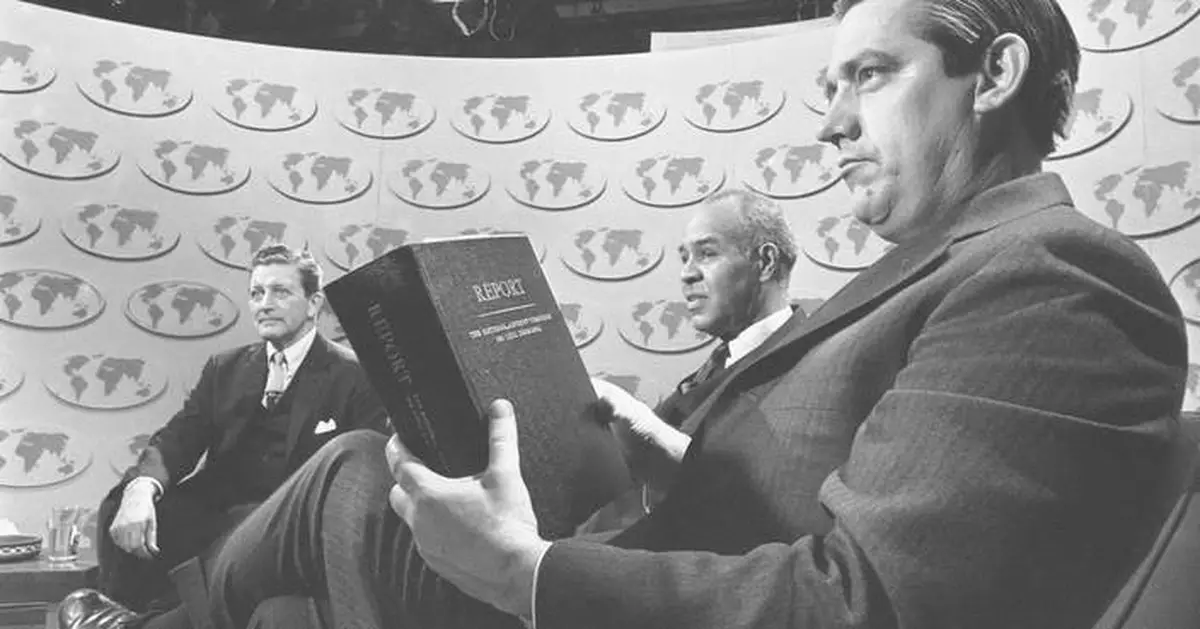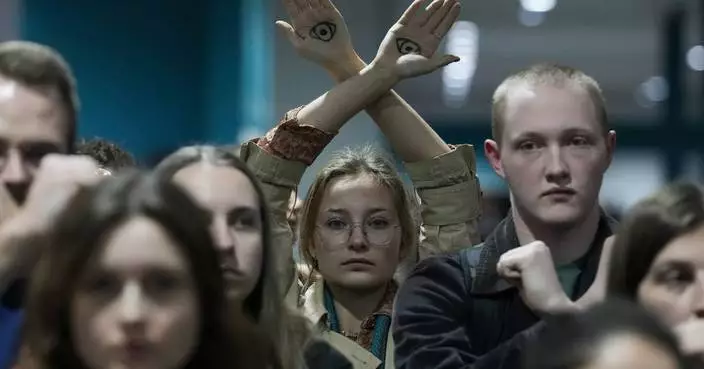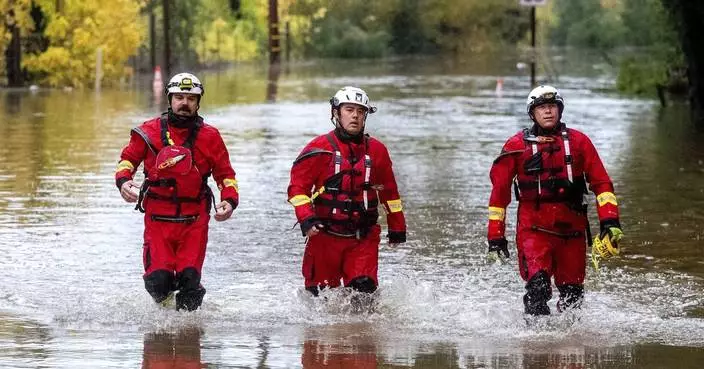Fred Harris, a former U.S. senator from Oklahoma, presidential hopeful and populist who championed Democratic Party reforms in the turbulent 1960s, died Saturday. He was 94.
Harris’ wife, Margaret Elliston, confirmed his death to The Associated Press. It was not immediately clear where he died, but he had lived in New Mexico since 1976 and was a resident of Corrales at the time of his death.
“Fred Harris passed peacefully early this morning of natural causes. He was 94. He was a wonderful and beloved man. His memory is a blessing,” Elliston said in a text message.
Harris served eight years in the Senate, first winning in 1964 to fill a vacancy, and made unsuccessful bid for the presidency in 1976.
It fell to Harris, as chairman of the Democratic National Committee in 1969 and 1970, to help heal the party’s wounds from the tumultuous national convention in 1968 when protesters and police clashed in Chicago.
He ushered in rule changes that led to more women and minorities as convention delegates and in leadership positions.
“I think it’s worked wonderfully,” Harris recalled in 2004, when he was a delegate to the Democratic National Convention in Boston. “It’s made the selection much more legitimate and democratic.”
“The Democratic Party was not democratic, and many of the delegations were pretty much boss-controlled or -dominated. And in the South, there was terrible discrimination against African Americans,” he said.
Harris ran unsuccessfully for the Democratic presidential nomination in 1976, quitting after poor showings in early contests, including a fourth-place win in New Hampshire. The more moderate Jimmy Carter went on to win the presidency.
Harris moved to New Mexico that year and became a political science professor at the University of New Mexico. He wrote and edited more than a dozen books, mostly on politics and Congress. In 1999 he broadened his writings with a mystery set in Depression-era Oklahoma.
Throughout his political career, Harris was a leading liberal voice for civil rights and anti-poverty programs to help minorities and the disadvantaged.
“Democrats everywhere will remember Fred for his unparalleled integrity and as a pioneer for instituting core progressive values of equity and opportunity for prosperity as core tenets of our party,” the Democratic Party of New Mexico said in a statement.
Along with his first wife, LaDonna, a Comanche, he also was active in Native American issues.
“I’ve always called myself a populist or progressive,” Harris said in a 1998 interview. “I’m against concentrated power. I don’t like the power of money in politics. I think we ought to have programs for the middle class and working class.”
New Mexico Gov. Michelle Lujan Grisham praised his work for their shared state and the nation.
“In addition to being a highly accomplished politician and professor, he was a decent, honorable man who treated everyone with warmth, generosity, and good humor,” she said in a statement. “Sen. Harris was a lesson in leadership that public officials would be wise to emulate now and forever.”
Harris was a member of the National Advisory Commission on Civil Disorders, the so-called Kerner Commission, appointed by then-President Lyndon Johnson to investigate the urban riots of the late 1960s.
The commission’s groundbreaking report in 1968 declared, “our nation is moving toward two societies, one black, one white — separate and unequal.”
Thirty years later, Harris co-wrote a report that concluded the commission’s “prophecy has come to pass.”
“The rich are getting richer, the poor are getting poorer and minorities are suffering disproportionately,” said the report by Harris and Lynn A. Curtis, president of the Milton S. Eisenhower Foundation, which continued the work of the commission.
Norman Ornstein of the American Enterprise Institute said Harris rose to prominence in Congress as a “fiery populist.”
“That resonates with people ... the notion of the average person against the elite,” Ornstein said. “Fred Harris had a real ability to articulate those concerns, particularly of the downtrodden.”
In 1968, Harris served as co-chairman of the presidential campaign of then-Vice President Hubert Humphrey. He and others pressed Humphrey to use the convention to break with Johnson on the Vietnam War. But Humphrey waited to do so until late in the campaign, and narrowly lost to Republican Richard Nixon.
“That was the worst year of my life, ’68. We had Dr. Martin Luther King killed. We had my Senate seatmate Robert Kennedy killed and then we had this terrible convention,” Harris said in 1996.
“I left the convention — because of the terrible disorders and the way they had been handled and the failure to adopt a new peace platform — really downhearted.”
After assuming the Democratic Party leadership post, Harris appointed commissions that recommended reforms in the procedures for selecting delegates and presidential nominees. While lauding the greater openness and diversity, he said there had been a side effect: “It’s much to the good. But the one result of it is that conventions today are ratifying conventions. So it’s hard to make them interesting.”
“My own thought is they ought to be shortened to a couple of days. But they are still worth having, I think, as a way to adopt a platform, as a kind of pep rally, as a way to get people together in a kind of coalition-building,” he said.
Harris was born Nov. 13, 1930, in a two-room farmhouse near Walters, in southwestern Oklahoma, about 15 miles from the Texas line. The home had no electricity, indoor toilet or running water.
At age 5 he was working on the farm and received 10 cents a day to drive a horse in circles to supply power for a hay bailer.
He worked part-time as a janitor and printer’s assistant to help for his education at University of Oklahoma. He earned a bachelor’s degree in 1952, majoring in political science and history. He received a law degree from the University of Oklahoma in 1954, and then moved to Lawton to practice.
In 1956, he won election to the Oklahoma state Senate and served for eight years. In 1964, he launched his career in national politics in the race to replace Sen. Robert S. Kerr, who died in January 1963.
Harris won the Democratic nomination in a runoff election against J. Howard Edmondson, who left the governorship to fill Kerr’s vacancy until the next election. In the general election, Harris defeated an Oklahoma sports legend — Charles “Bud” Wilkinson, who had coached OU football for 17 years.
Harris won a six-year term in 1966 but left the Senate in 1972 when there were doubts that he, as a left-leaning Democrat, could win reelection.
Harris married his high school sweetheart, LaDonna Vita Crawford, in 1949, and had three children, Kathryn, Byron and Laura. After the couple divorced, Harris married Margaret Elliston in 1983. A complete list of survivors was not immediately available Saturday.
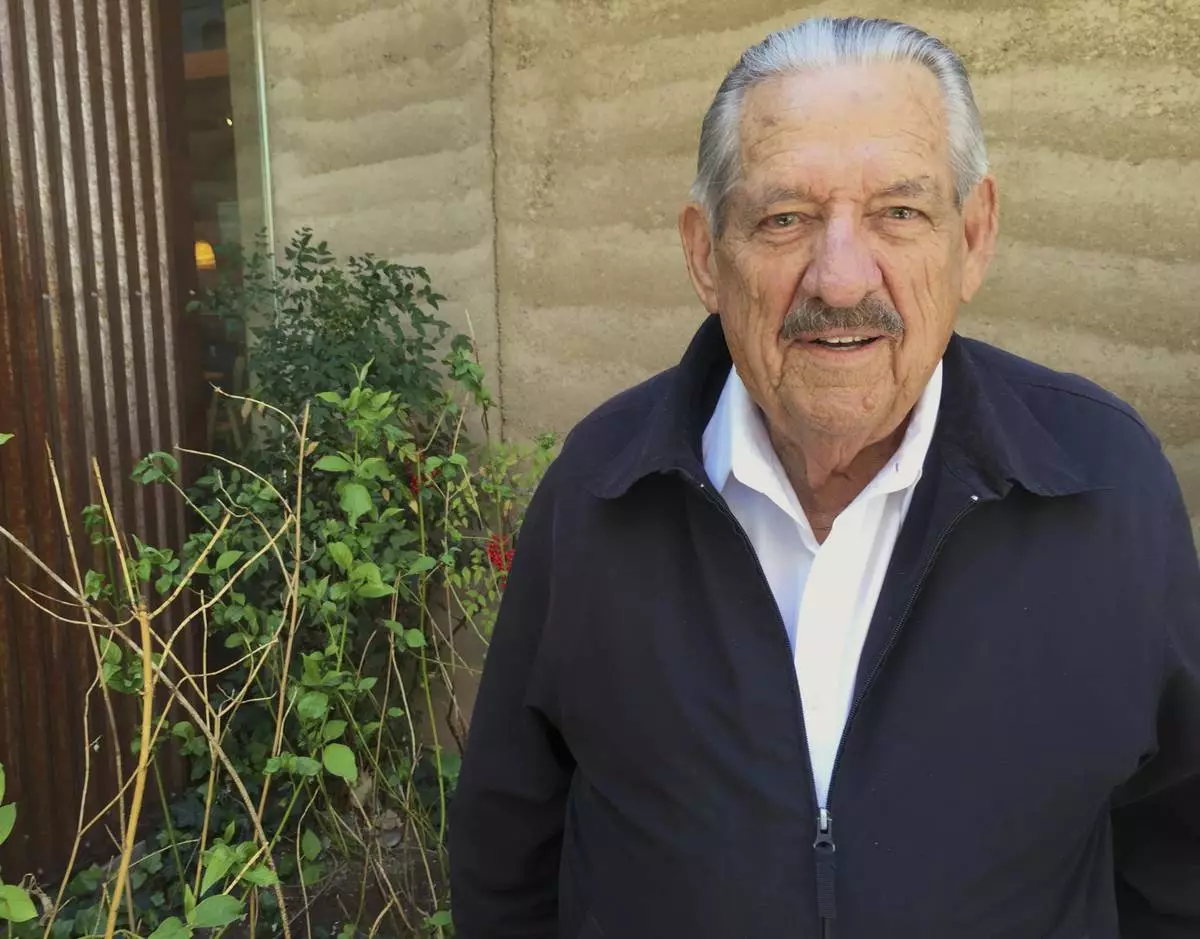
FILE - Former Democratic National Committee Chairman Fred Harris poses for a photo at a restaurant on May 3, 2016, in Corrales, N.M., the town where he lives. (AP Photo/Morgan Lee, File)
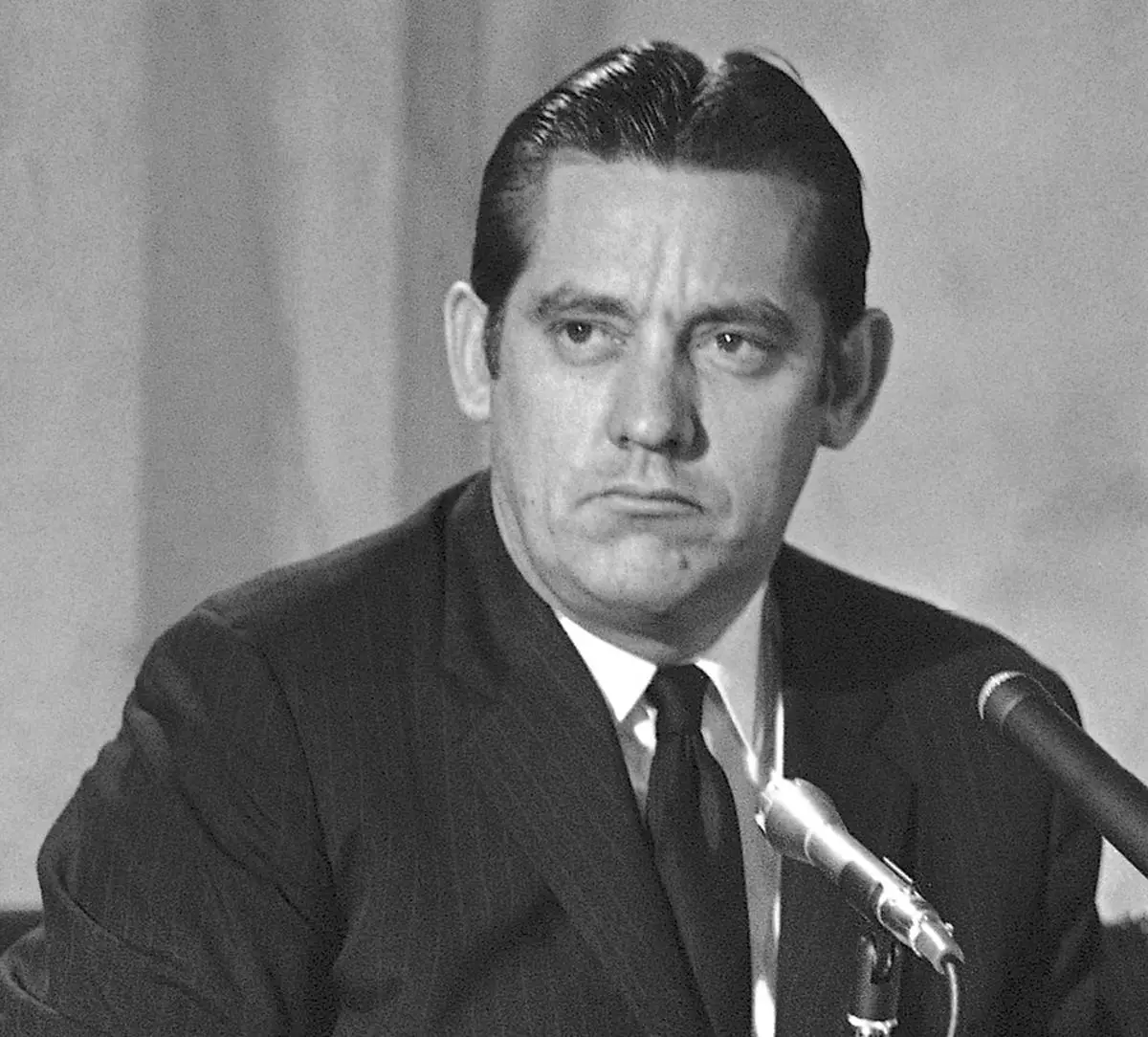
FILE - Sen. Fred Harris of Oklahoma at a Democratic party commission meeting on March 1, 1969, in Washington. (AP Photo, File)
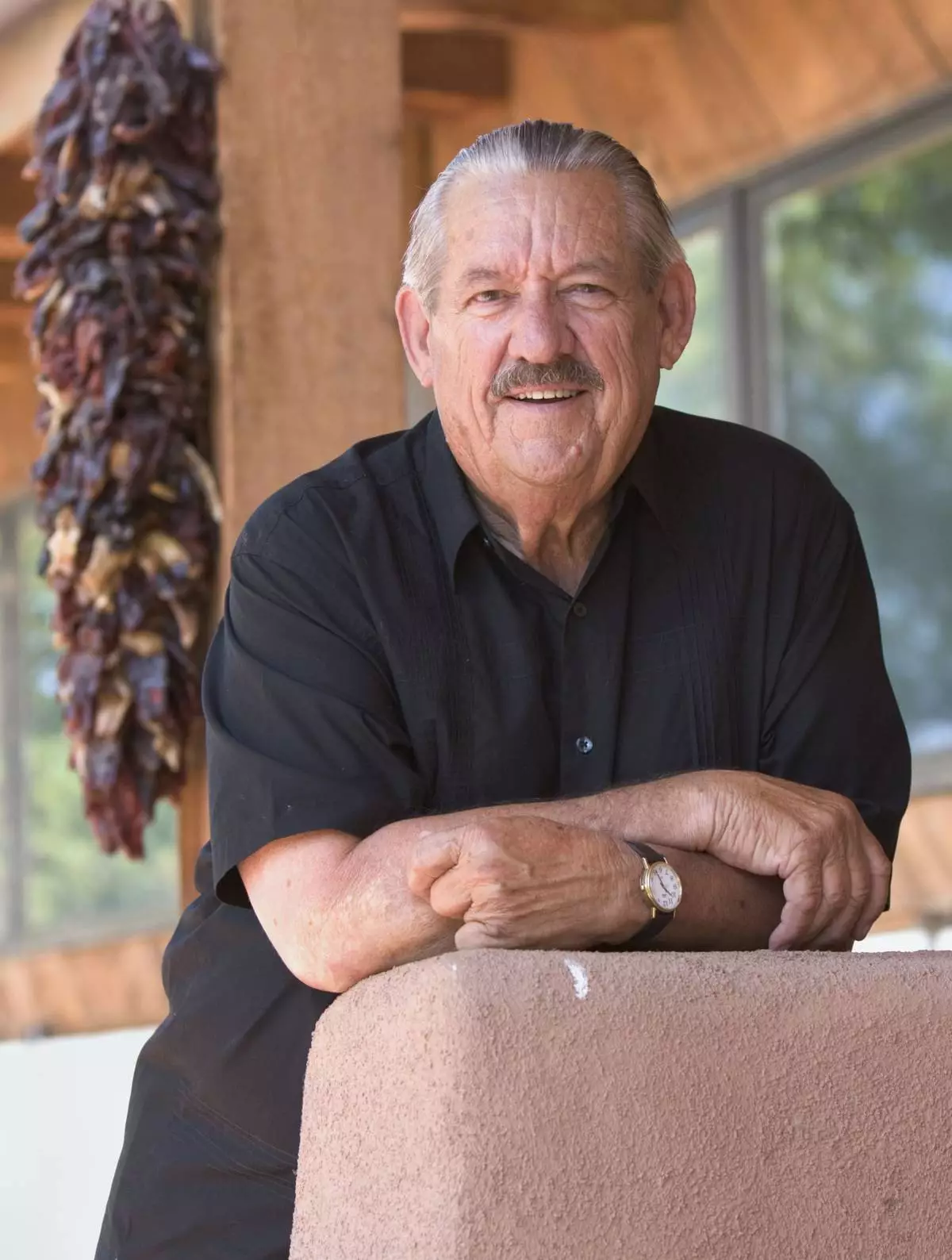
FILE - Former Oklahoma Sen. Fred Harris stands outside his Corrales, N.M., home, Friday, July 23, 2004. (AP Photo/Jake Schoellkopf, File)
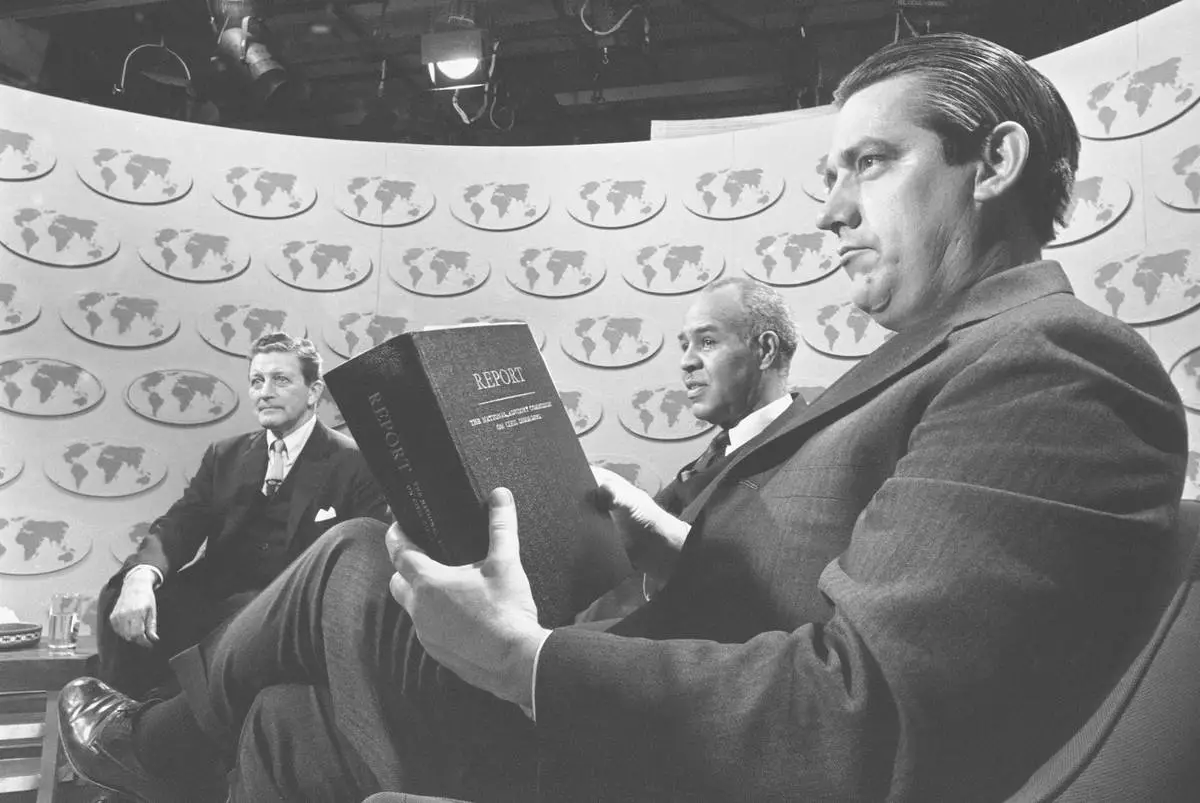
FILE - Sen. Fred R. Harris (D-Okla.), holds a copy of the report of the National Advisory Commission on Civil Disorders as he and two other members of the commission discuss the study on the television-radio program "Issues and Answers," in Washington, March 3, 1968. (AP Photo/Bob Daugherty, File)
BEIRUT, Lebanon (AP) — Israeli airstrikes Saturday in central Beirut killed at least 20 people, officials said, as the once-rare attacks on the heart of Lebanon's capital continued without warning while diplomats scrambled to broker a cease-fire.
Lebanon's Health Ministry said 66 people were wounded in the strikes, which were the fourth in central Beirut in less than a week.
The escalation comes after U.S. envoy Amos Hochstein traveled to the region in pursuit of a deal to end months of fighting between Israel and Hezbollah that has erupted into full-on war.
Israeli attacks have killed more than 3,500 people in Lebanon, according to Lebanon's Health Ministry. The fighting has displaced about 1.2 million people, or a quarter of Lebanon’s population. On the Israeli side, about 90 soldiers and nearly 50 civilians have been killed by bombardment in northern Israel and the fighting.
The 4 a.m. strikes destroyed an eight-story building in central Beirut. Hezbollah legislator Amin Shiri said no Hezbollah officials were inside. The attack stripped the facades from some nearby buildings and crumpled cars.
“The area is residential, with closely packed buildings and narrow streets, making the situation challenging,” said Walid Al-Hashash, a first responder with the Lebanese Civil Defense.
Israel’s military did not comment on the casualties.
Also Saturday, a drone strike killed two people and injured three in the southern Lebanese port city of Tyre, according to the Lebanese state-run National News Agency.
Mohammed Bikai, spokesperson for the Fatah Palestinian faction in the Tyre area, said those killed were Palestinian refugees from nearby al-Rashidieh camp who were out fishing.
Despite a warning last month by Israel's army to avoid Lebanon's southern coast, "you can’t tell someone who needs to eat that you can’t fish," Bikai said.
The Health Ministry said other airstrikes killed eight people, including four children, in the eastern town of Shmustar, five others in the southern village of Roumin, and another five people in the northeastern village of Budai.
Two Western diplomatic officials on Saturday described disputed points between Israel and Lebanon in cease-fire negotiations. They spoke on condition of anonymity because they were not authorized to discuss the talks.
The current proposal calls for a two-month cease-fire during which Israeli forces would withdraw from Lebanon and Hezbollah would end its armed presence along the southern border south of the Litani River. Thousands more Lebanese army troops would patrol the border area with U.N. peacekeepers, and an international committee would monitor the deal's implementation.
The officials said Israel wanted more guarantees that Hezbollah’s weapons are removed from the border area. Israeli officials have said they would not agree to a deal that did not explicitly grant them freedom to strike in Lebanon if they believe Hezbollah is violating it.
Lebanese officials have said the inclusion of such a term would violate their country's sovereignty. And Hezbollah leader Naim Kassem said this week that the militant group would not agree to a deal that doen'ts not entail a “complete and comprehensive end to the aggression."
Lebanon and Israel also dispute which countries would sit on the monitoring committee. The officials said Israel refused to allow France, which has been close with Lebanon since its colonial rule there ended. Lebanon refused to have Britain, a close ally of Israel.
In northern Gaza, the Health Ministry said at least 80 people, total, were killed on Thursday and Friday, including near the Kamal Adwan and Al-Ahli hospitals. It said dozens of people were trapped under the rubble.
Israel’s army said it wasn't aware of a strike near Kamal Adwan, and it didn’t respond to questions about the other attacks.
On Saturday, at least six people, including three children and two women, were killed in the southern city of Khan Younis, according to Associated Press reporters and staff at Nasser Hospital.
“Suddenly we woke up to dust, smoke and a fire,” said one grieving father, Ahmad Ghassan. “We found him dead and his brother injured.” Another father wept as he carried his child's body in a bloodstained sheet.
And Al-Awda Hospital said it received six bodies after Israel shelled a house north of the Nuseirat refugee camp in central Gaza.
The Palestinian death toll from the 13-month-long war surpassed 44,000 this week, according to the Health Ministry, which doesn't distinguish between civilians and combatants in its count. It has said more than half the dead are women and children. The Israeli military says it has killed over 17,000 militants, without providing evidence.
The war began when Hamas-led militants stormed into southern Israel on Oct. 7, 2023, killing some 1,200 people, mostly civilians, and abducting another 250. Around 100 hostages are still inside Gaza, at least a third believed to be dead.
The Israeli offensive in Gaza has devastated wide areas, and around 90% of Gaza's 2.3 million people have been displaced, often multiple times. Hundreds of thousands live in tent camps with little food, water or basic services.
At least two women were shot dead Saturday while waiting in line for bread in central Deir al-Balah, relatives and witnesses told the AP. It was unclear who shot them and why.
The United Nations says its attempts to support hard-hit northern Gaza, which has been the focus of a renewed Israeli offensive for weeks, have been denied or impeded, and that less than 20% of the population has remained there since the offensive began.
Authorities in Jordan say they shot and killed a man who opened fire on a police patrol near the Israeli Embassy, an attack that left three police officers hurt.
The shooting happened early Sunday in the Rabiah neighborhood of Amman, the Jordanian capital.
Jordan’s Public Security Directorate said in a statement that a man was shooting in the area, and police pursued the shooter.
“He was chased and surrounded, so he started firing gunshots at the security force, which in turn applied the rules of engagement, which resulted in the killing of the perpetrator,” the statement said.
It did not identify the shooter.
Israel and Jordan reached a peace deal in 1994. Tensions have been high between the two countries amid the Israel-Hamas war, which has decimated the Gaza Strip, and the Israeli ground offensive in Lebanon.
Associated Press writers Fadi Tawil in Tyre, Lebanon, Ibrahim Hazboun in Jerusalem, Wafaa Shurafa in Deir al-Balah, Gaza Strip and Mohammad Jahjouh in Khan Younis, Gaza Strip contributed to this report.
——
Find more of AP’s war coverage at https://apnews.com/hub/israel-hamas-war
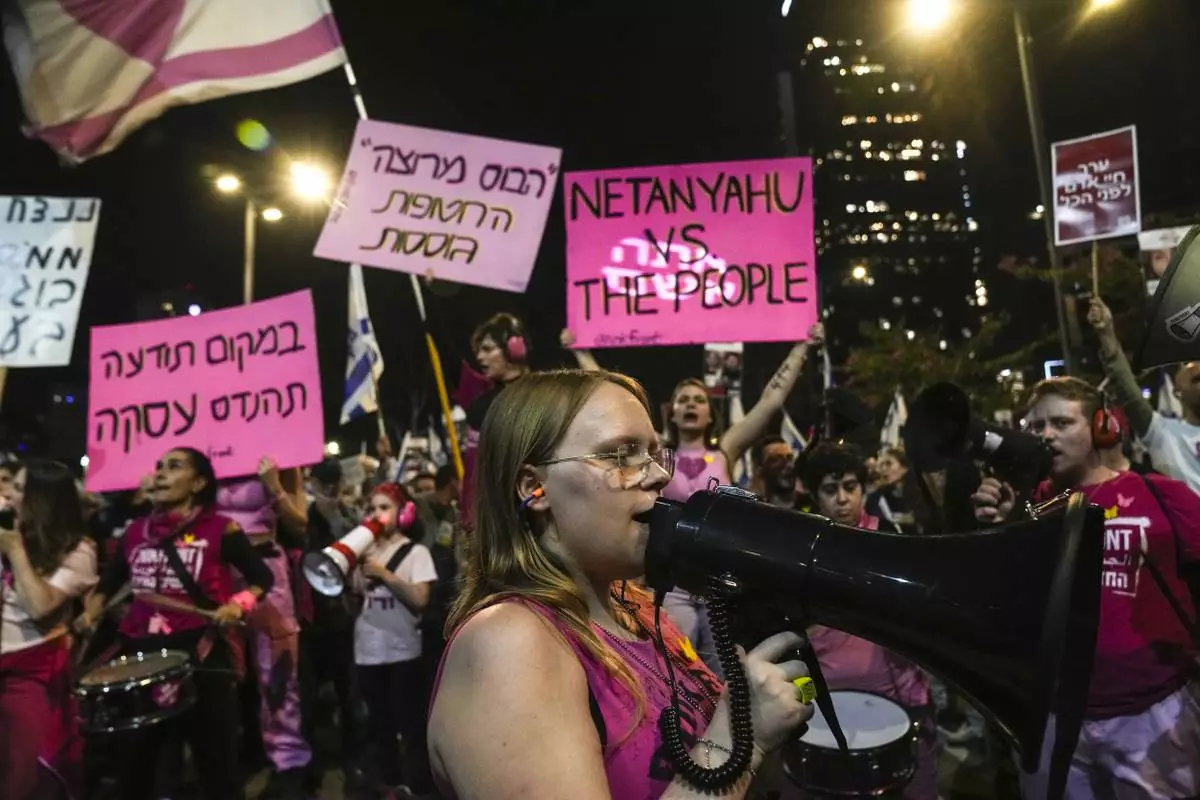
People shout slogans during a protest against Prime Minister Benjamin Netanyahu's government and call for the release of hostages held in the Gaza Strip by the Hamas militant group, in Tel Aviv, Israel, Saturday, Nov. 23, 2024. Boards on the left read in Hebrew: "The boss is satisfied, the hostages are dying" and "Instead of consciousness, make a deal". (AP Photo/Maya Alleruzzo)
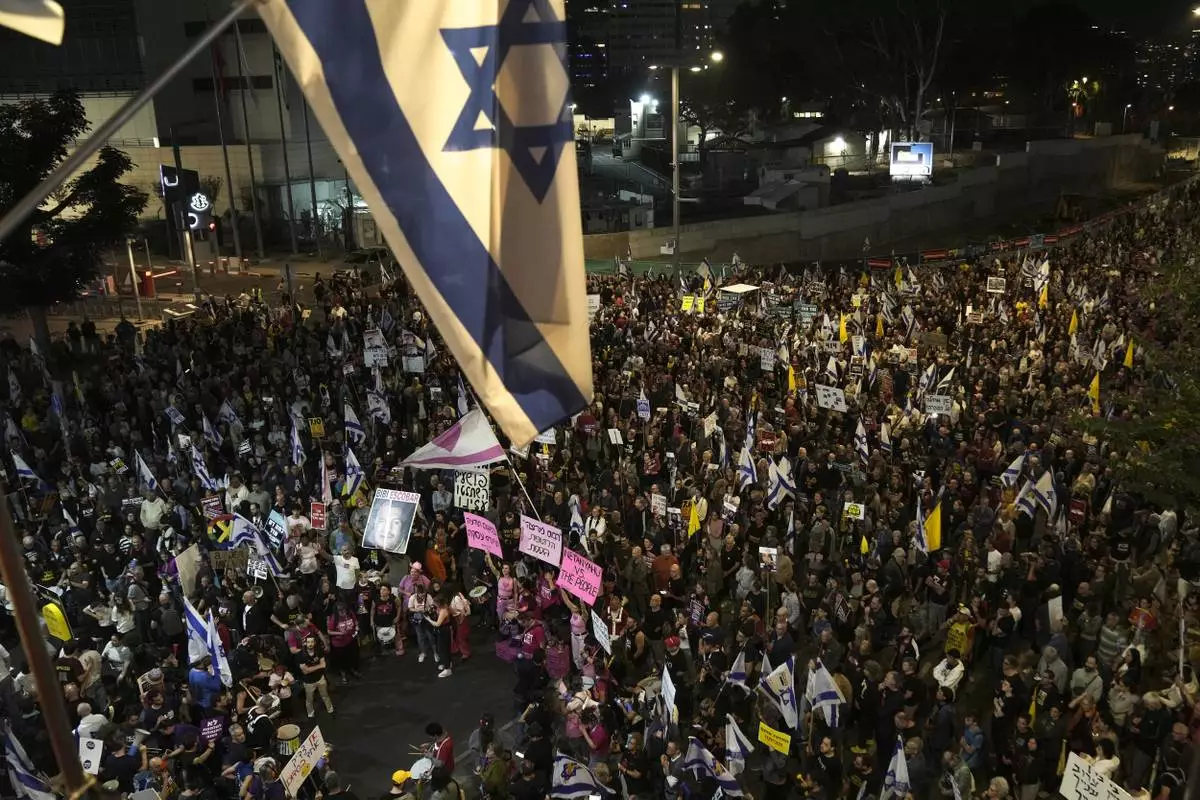
People gather to protest against Prime Minister Benjamin Netanyahu's government and call for the release of hostages held in the Gaza Strip by the Hamas militant group, in Tel Aviv, Israel, Saturday, Nov. 23, 2024. (AP Photo/Maya Alleruzzo)
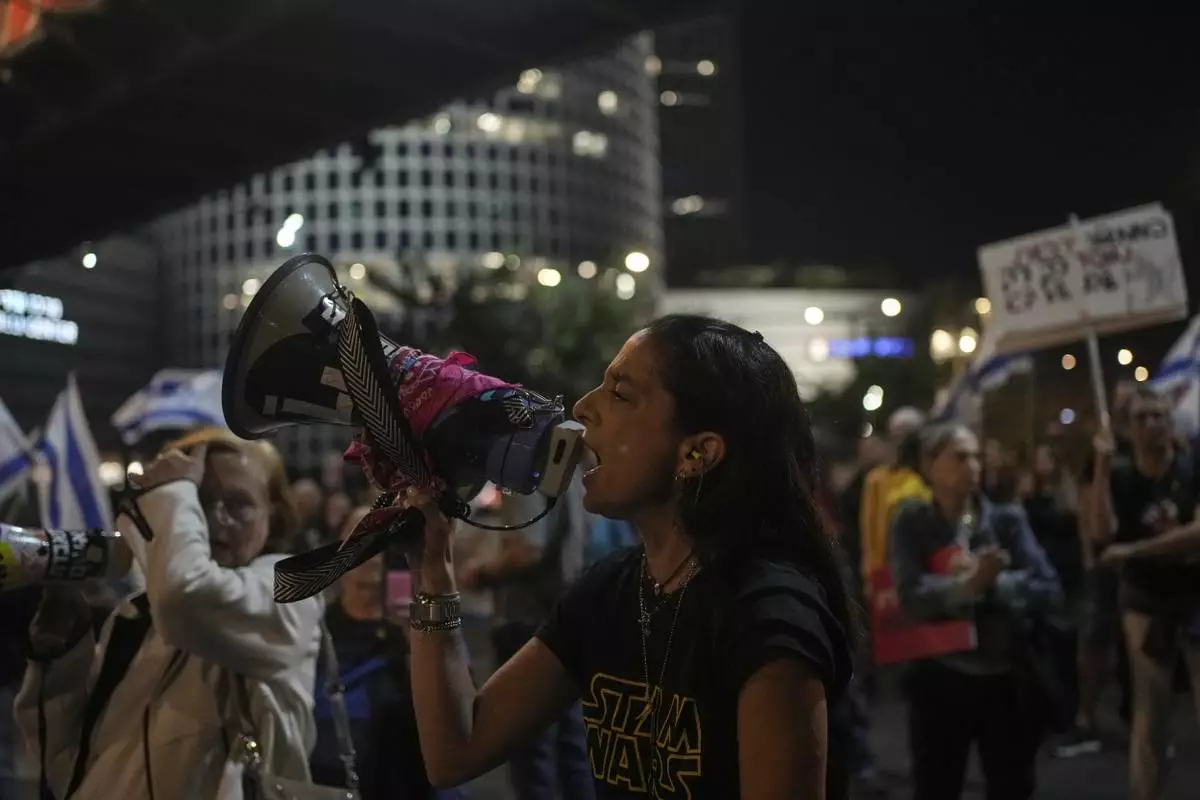
A woman shouts slogans during a protest against Prime Minister Benjamin Netanyahu's government and call for the release of hostages held in the Gaza Strip by the Hamas militant group, in Tel Aviv, Israel, Saturday, Nov. 23, 2024. (AP Photo/Maya Alleruzzo)
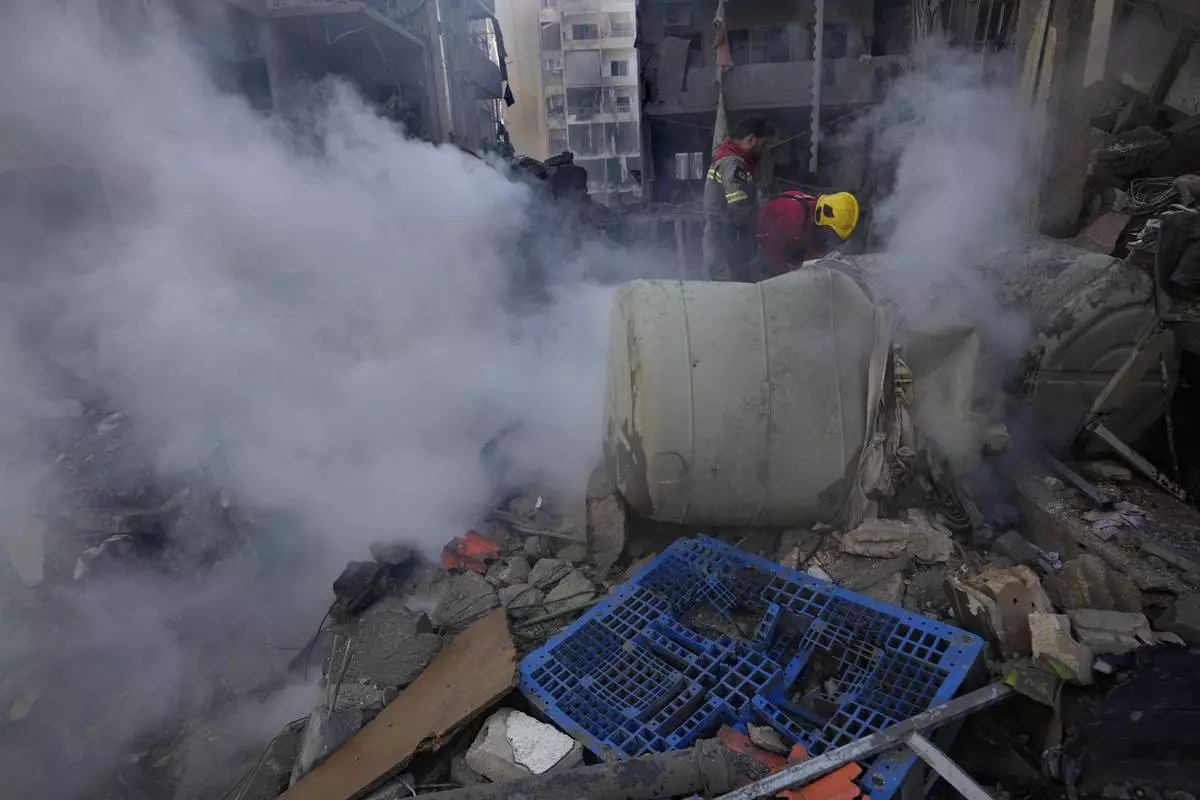
Rescue workers search for victims at the site of an Israeli airstrike that hit central Beirut, Lebanon, Saturday, Nov. 23, 2024. (AP Photo/Hussein Malla)
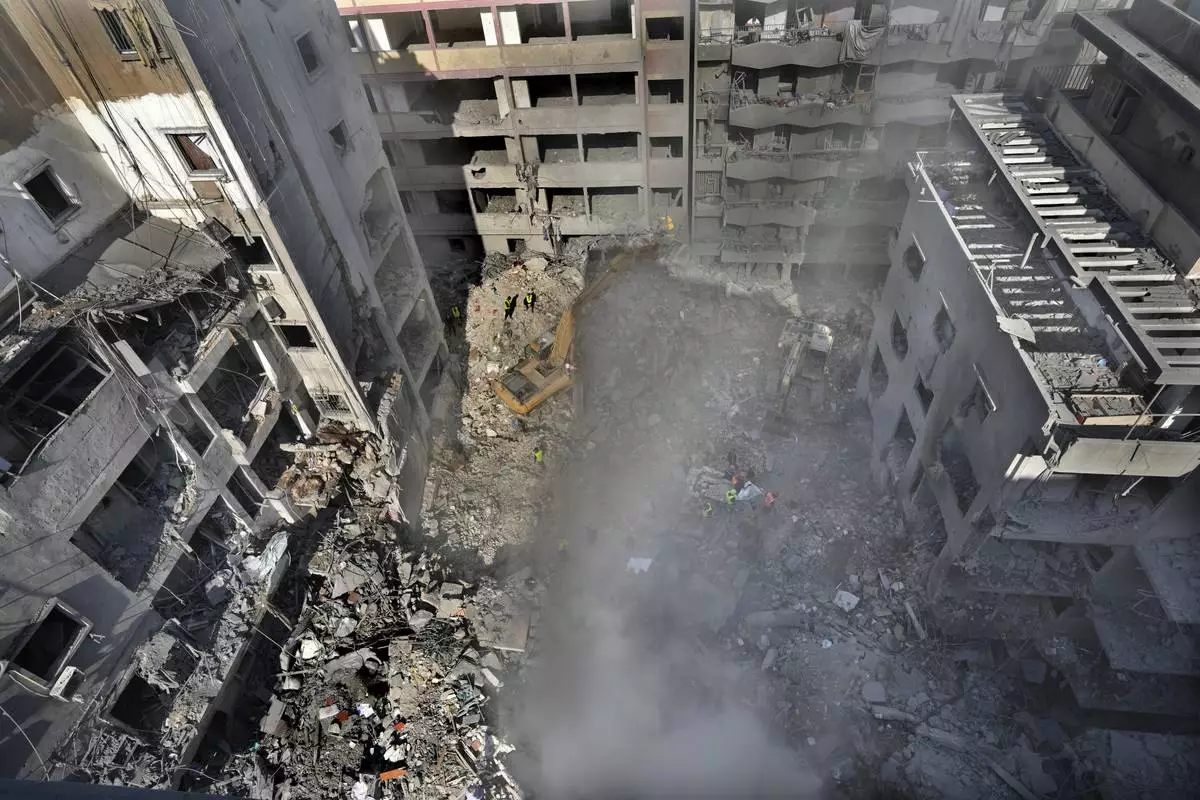
Rescue workers search for victims at the site of an Israeli airstrike that hit central Beirut, Lebanon, Saturday, Nov. 23, 2024. (AP Photo/Hussein Malla)
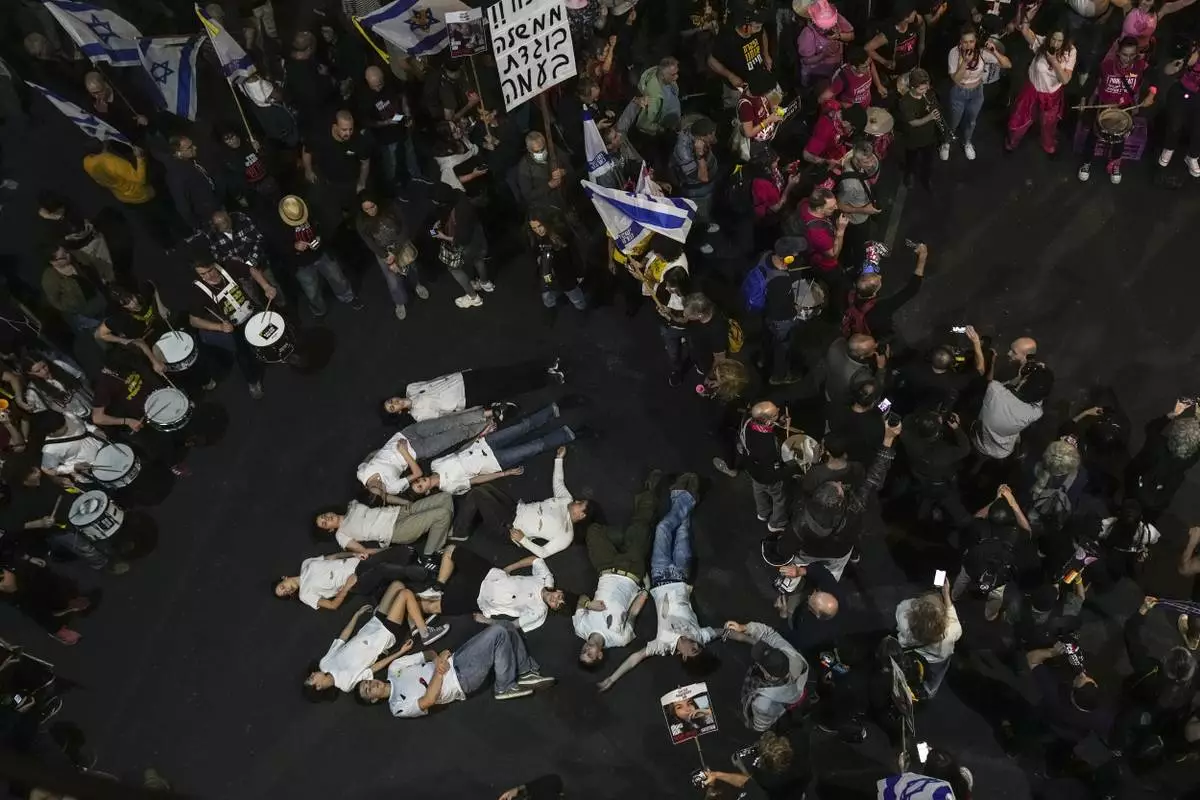
People gather to protest against Prime Minister Benjamin Netanyahu's government and call for the release of hostages held in the Gaza Strip by the Hamas militant group, in Tel Aviv, Israel, Saturday, Nov. 23, 2024. (AP Photo/Maya Alleruzzo)
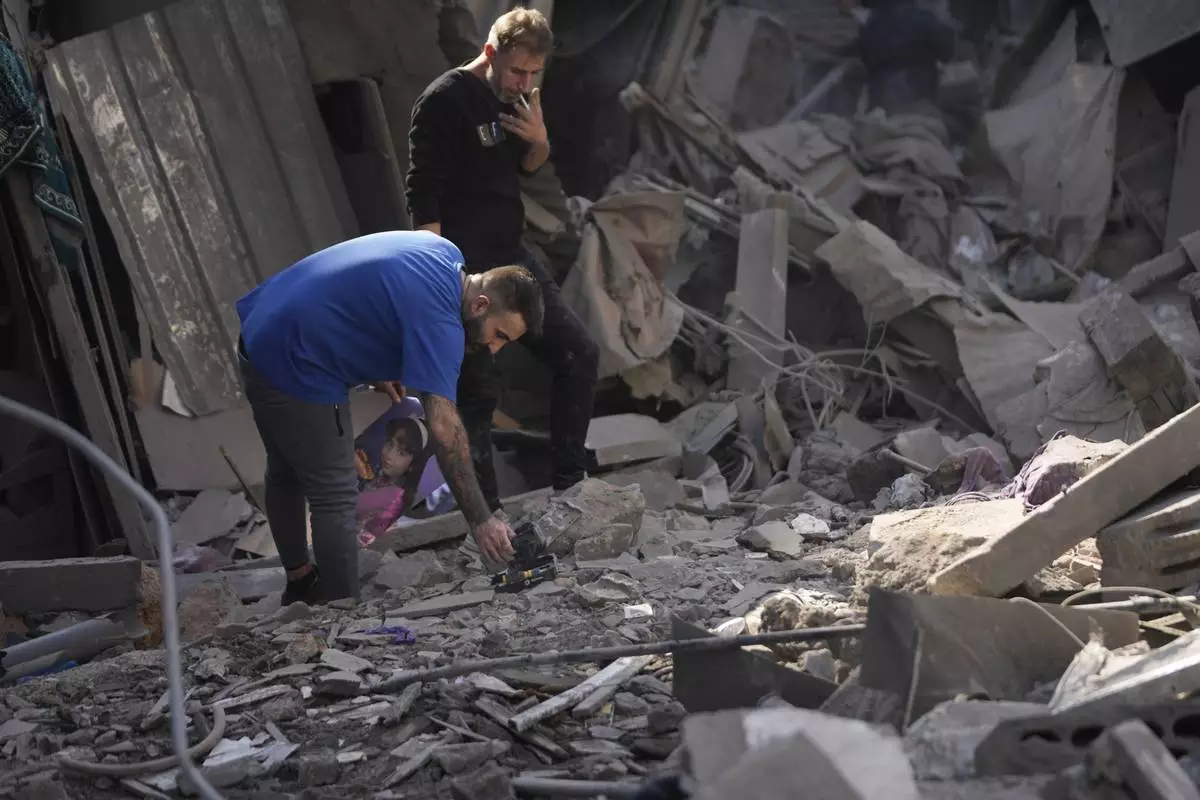
Two men stand at the site of an Israeli airstrike that hit central Beirut, Lebanon, Saturday, Nov. 23, 2024. (AP Photo/Hussein Malla)
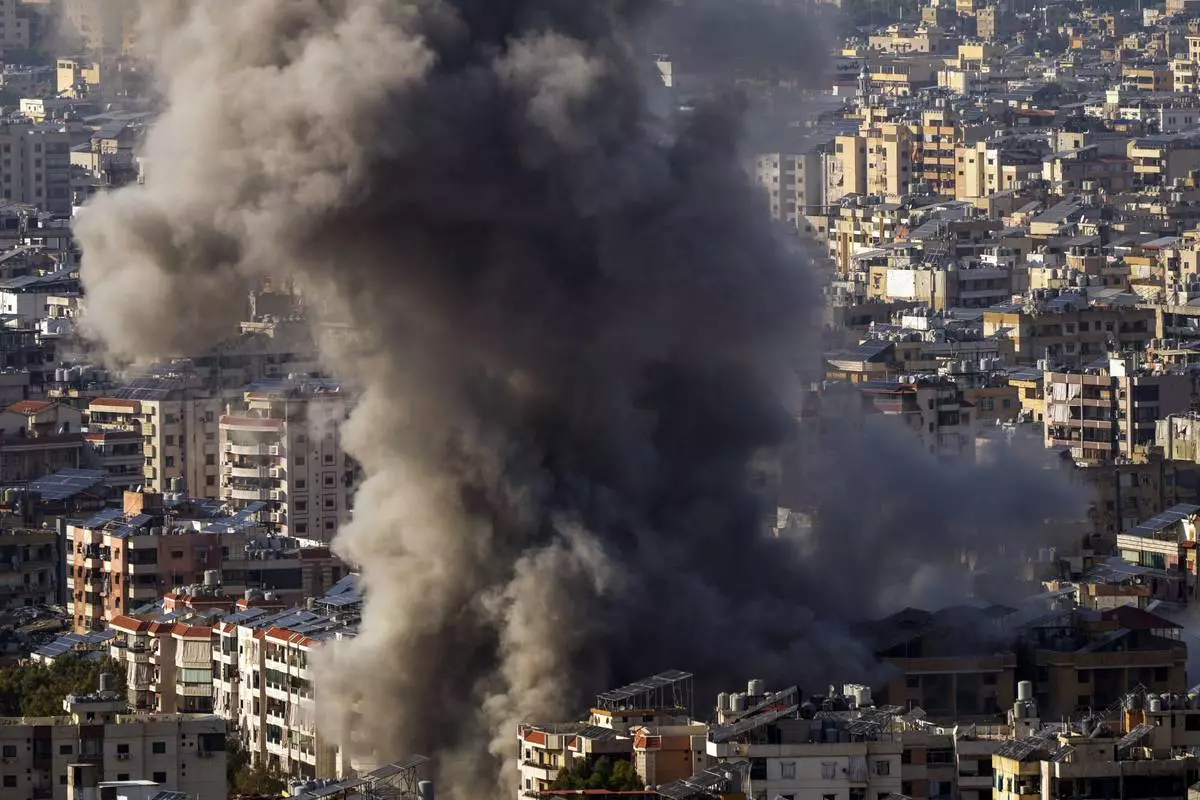
Smoke rises after an Israeli airstrike on Dahiyeh, in the southern suburb of Beirut, Lebanon, Saturday, Nov. 23, 2024. (AP Photo/Hassan Ammar)
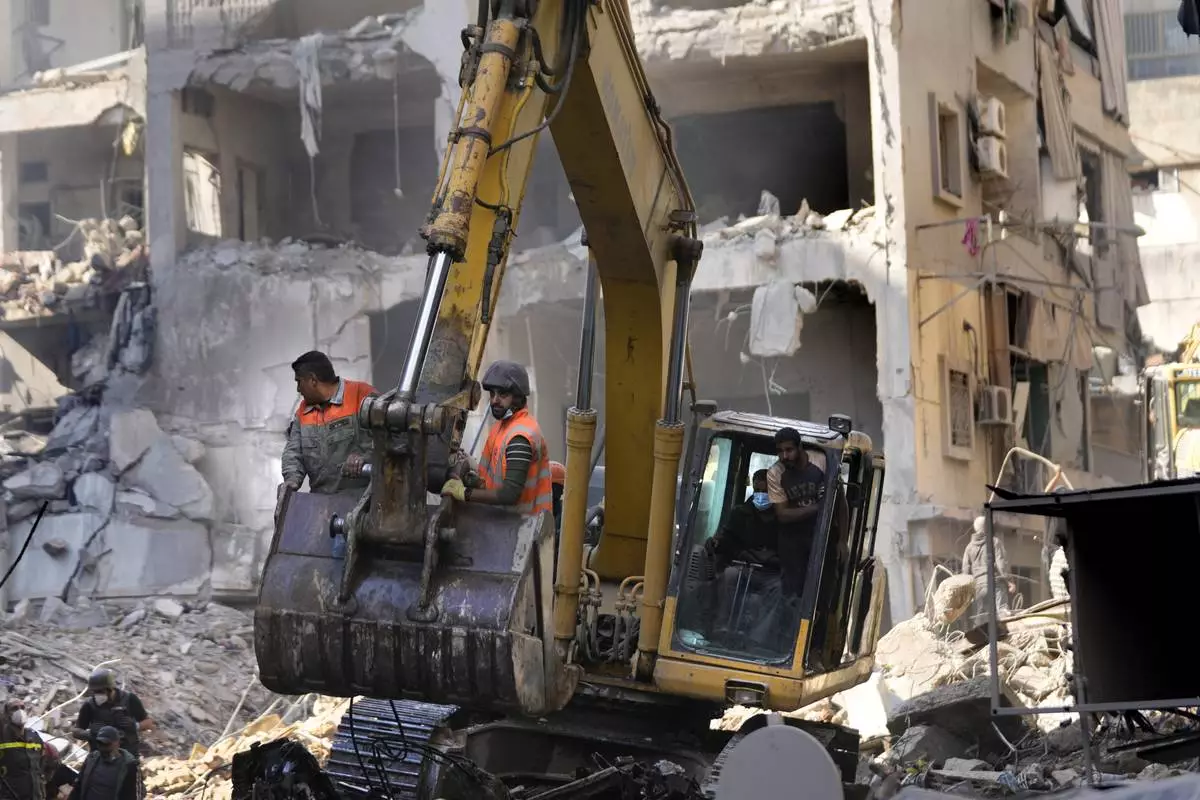
Rescue workers stand on an excavator as they search for victims at the site of an Israeli airstrike that hit central Beirut, Lebanon, Saturday, Nov. 23, 2024. (AP Photo/Hussein Malla)
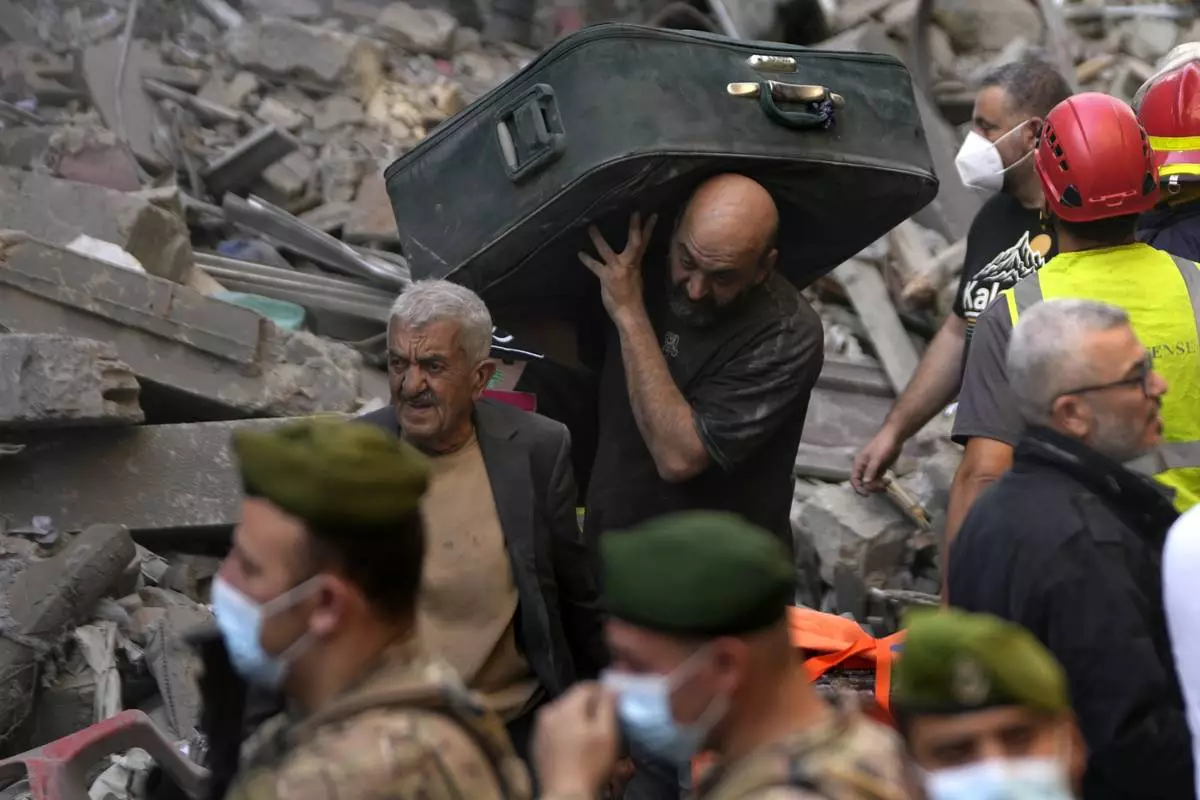
A man carries a suitcase as he leaves the site of an Israeli airstrike that hit central Beirut, Lebanon, Saturday, Nov. 23, 2024. (AP Photo/Hussein Malla)
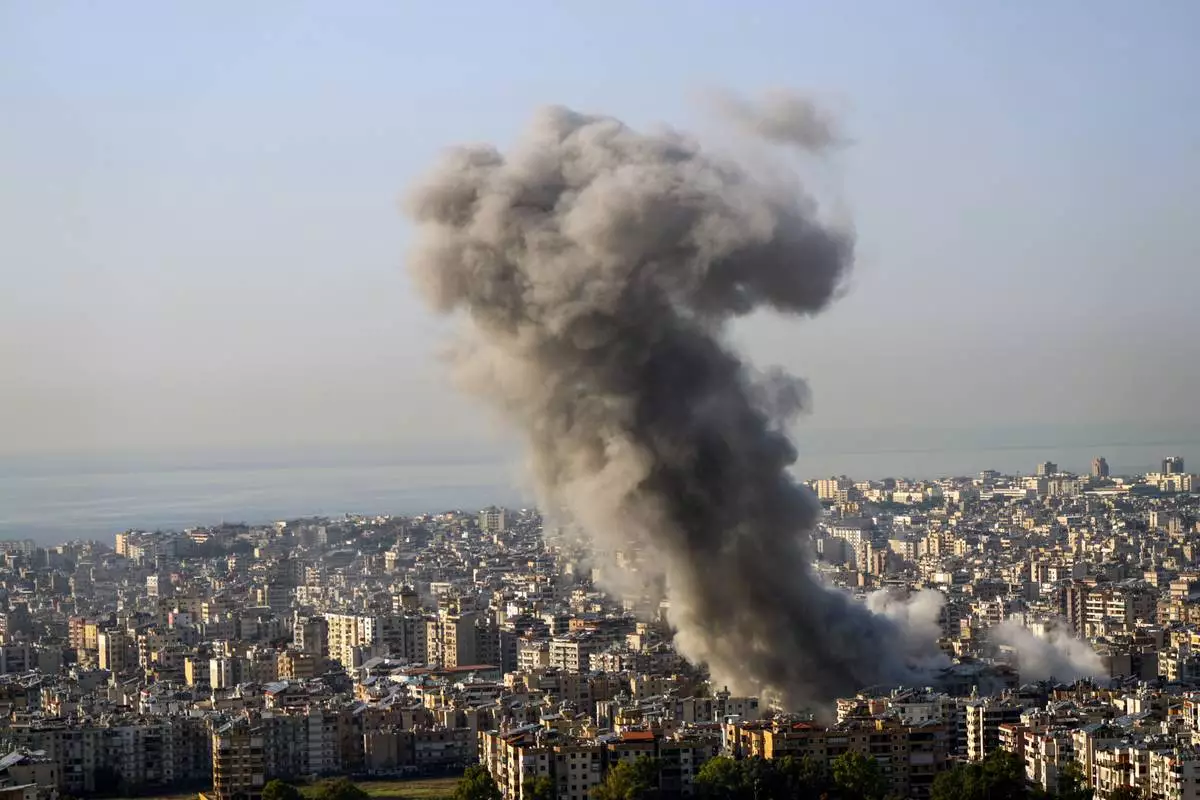
Smoke rises after an Israeli airstrike on Dahiyeh, in the southern suburb of Beirut, Lebanon, Saturday, Nov. 23, 2024. (AP Photo/Hassan Ammar)
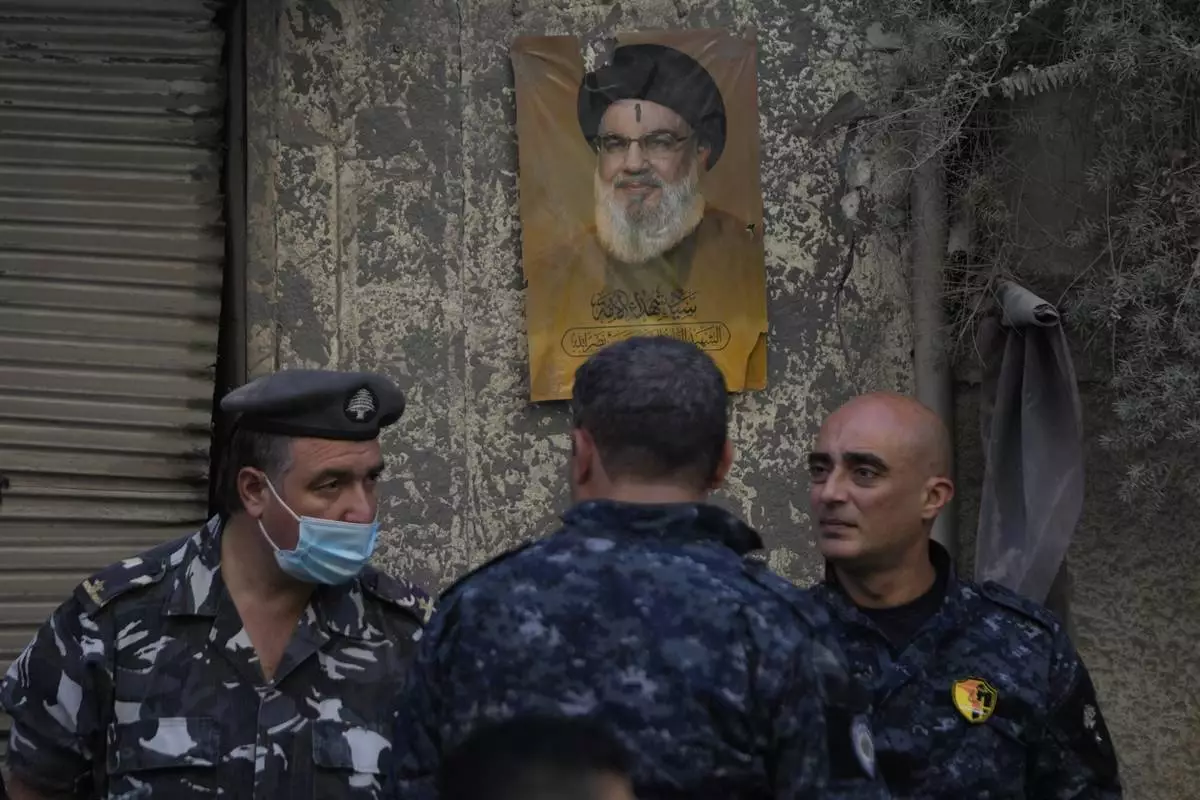
Lebanese police stand in front of a portrait shows the late Hezbollah leader Sayyed Hassan Nasrallah, at the site of an Israeli airstrike that hit central Beirut, Lebanon, Saturday, Nov. 23, 2024. (AP Photo/Hussein Malla)

A woman takes part in a protest against Prime Minister Benjamin Netanyahu's government and call for the release of hostages held in the Gaza Strip by the Hamas militant group, in Tel Aviv, Israel, Saturday, Nov. 23, 2024. (AP Photo/Maya Alleruzzo)
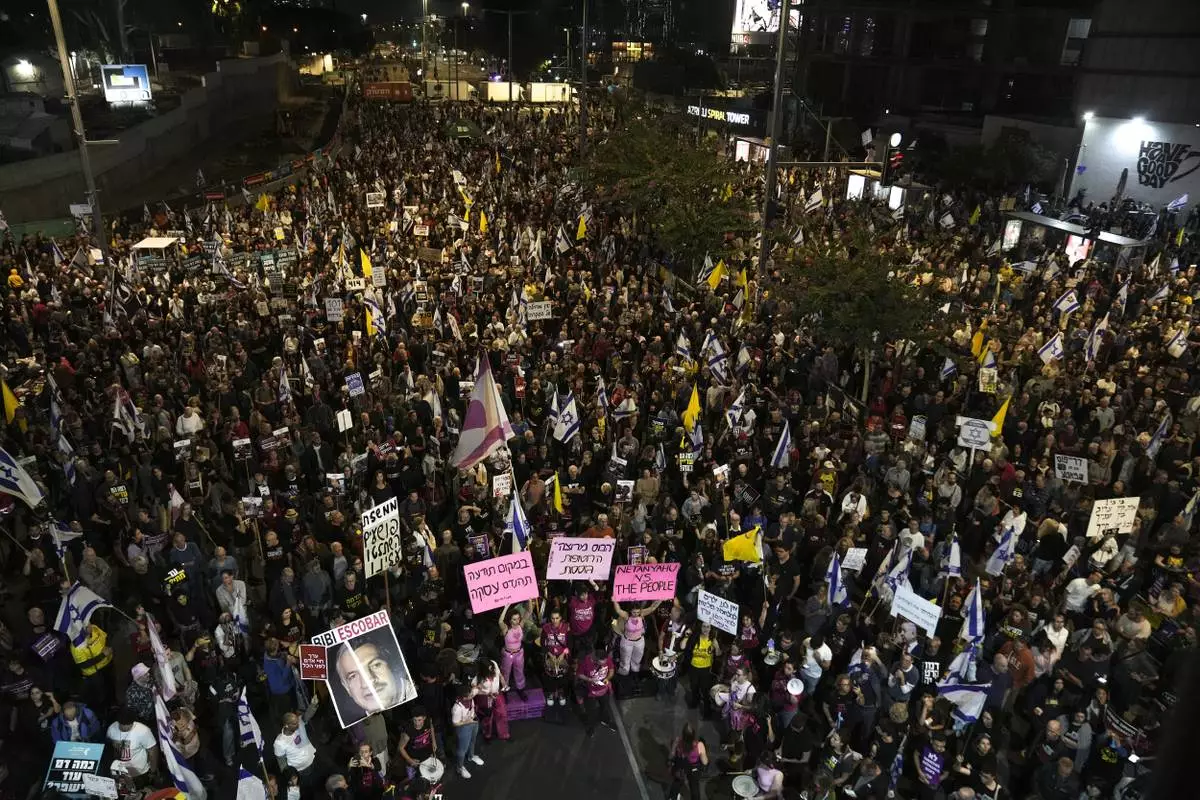
People gather to protest against Prime Minister Benjamin Netanyahu's government and call for the release of hostages held in the Gaza Strip by the Hamas militant group, in Tel Aviv, Israel, Saturday, Nov. 23, 2024. (AP Photo/Maya Alleruzzo)
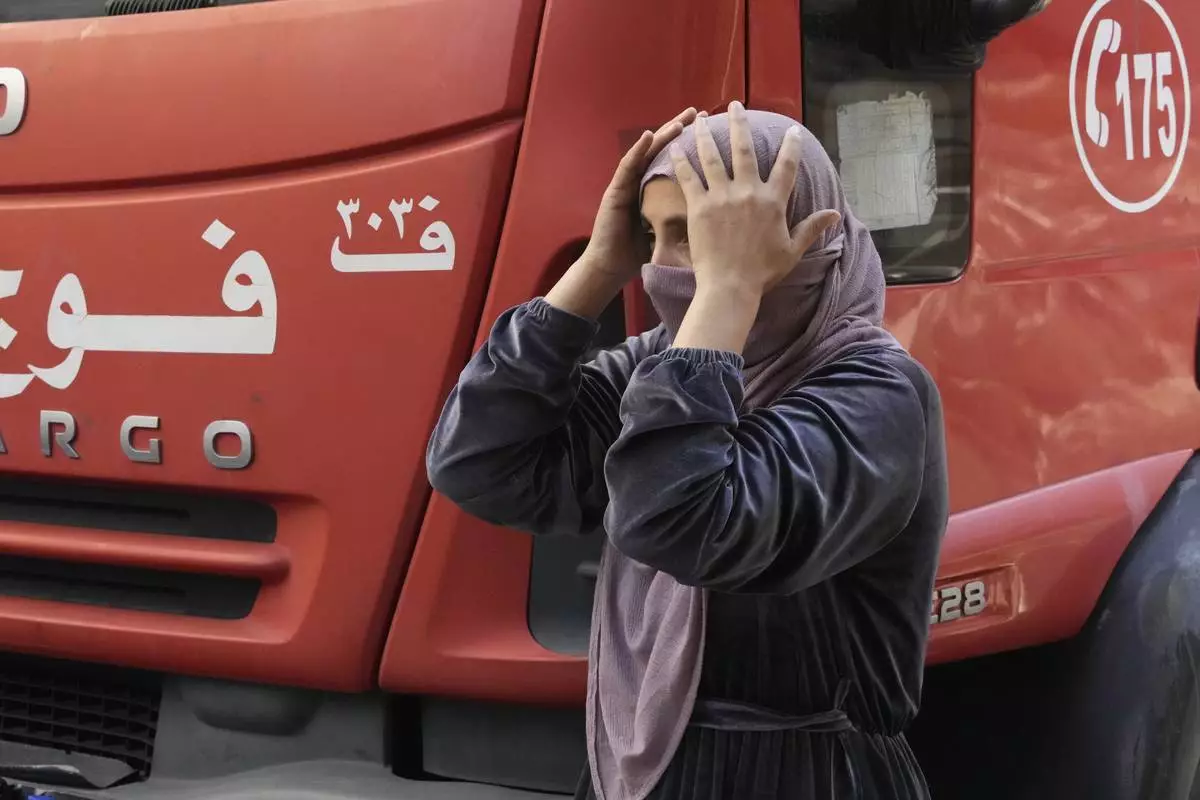
A Syrian woman mourns as rescue workers carry the body of a victim at the site of an Israeli airstrike that hit central Beirut, Lebanon, Saturday, Nov. 23, 2024. (AP Photo/Hassan Ammar)
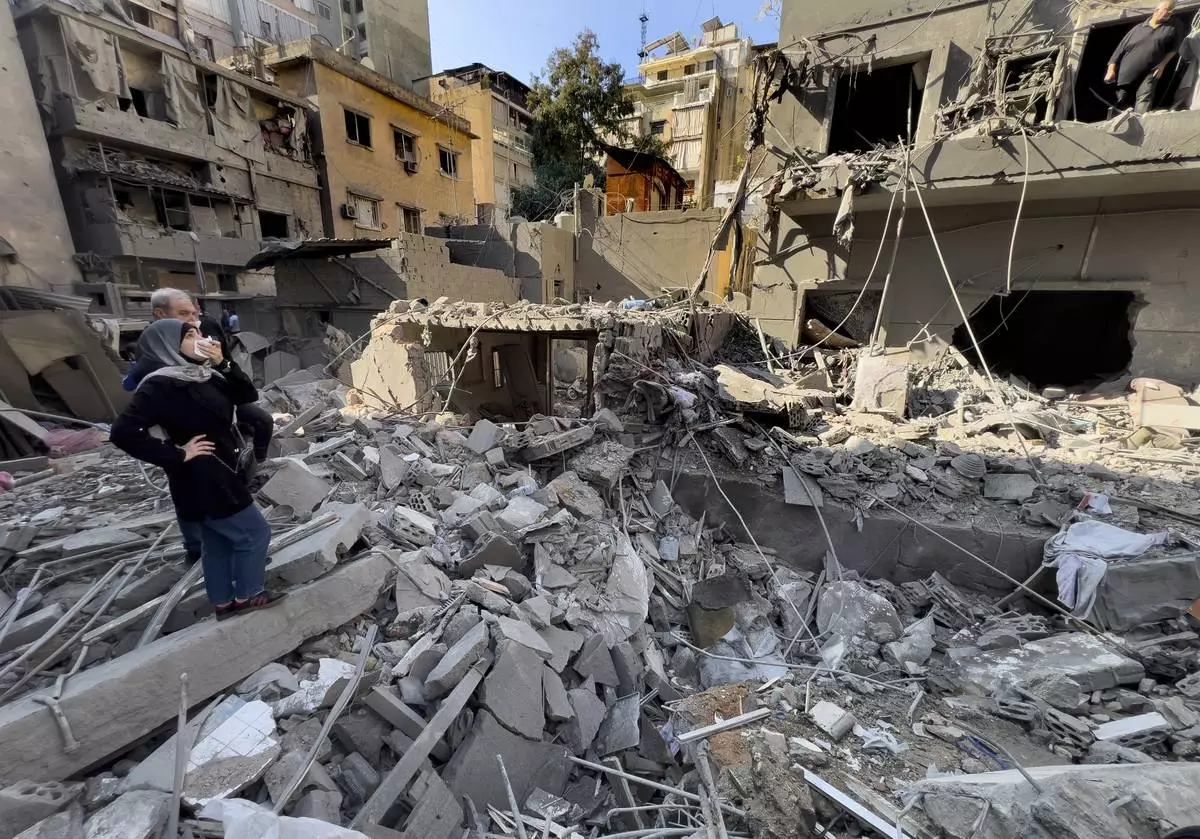
Residents observe the site of an Israeli airstrike that hit central Beirut, Lebanon, Saturday, Nov. 23, 2024. (AP Photo/Hussein Malla)
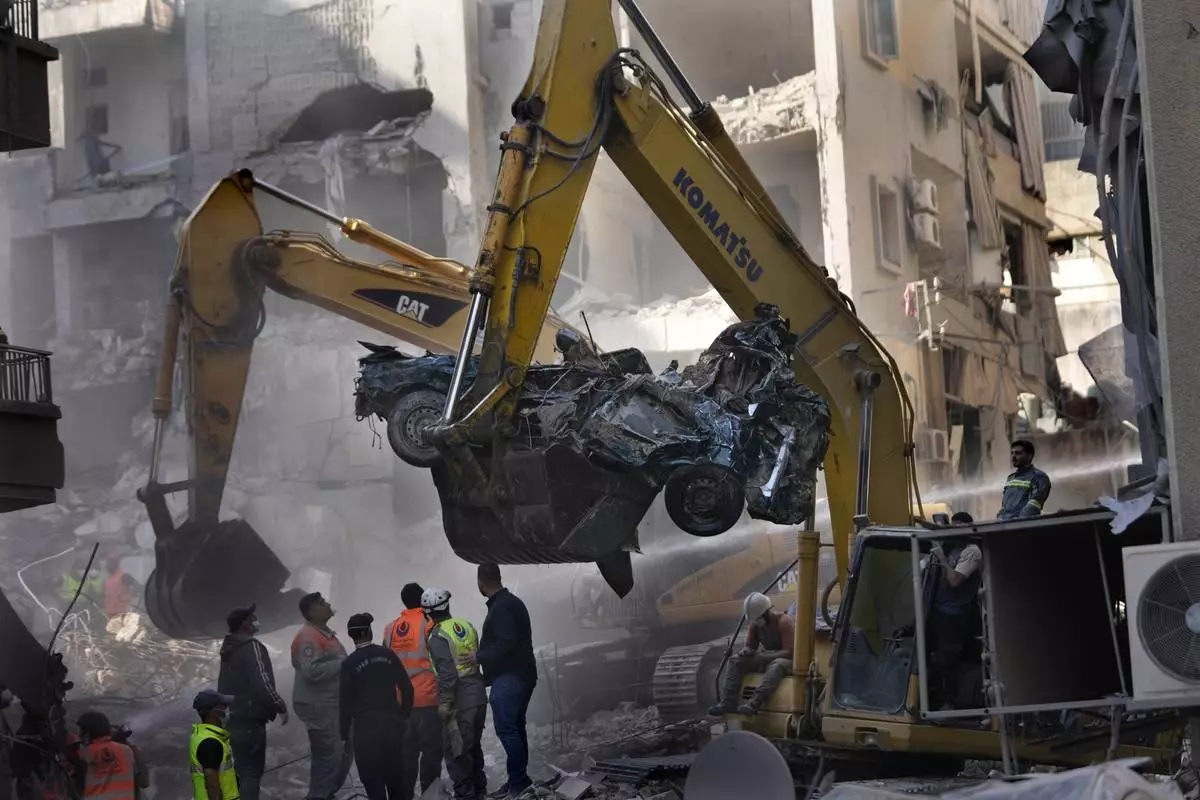
An excavator removes a destroyed car as rescue workers gather at the site of an Israeli airstrike that hit central Beirut, Lebanon, Saturday, Nov. 23, 2024. (AP Photo/Hussein Malla)
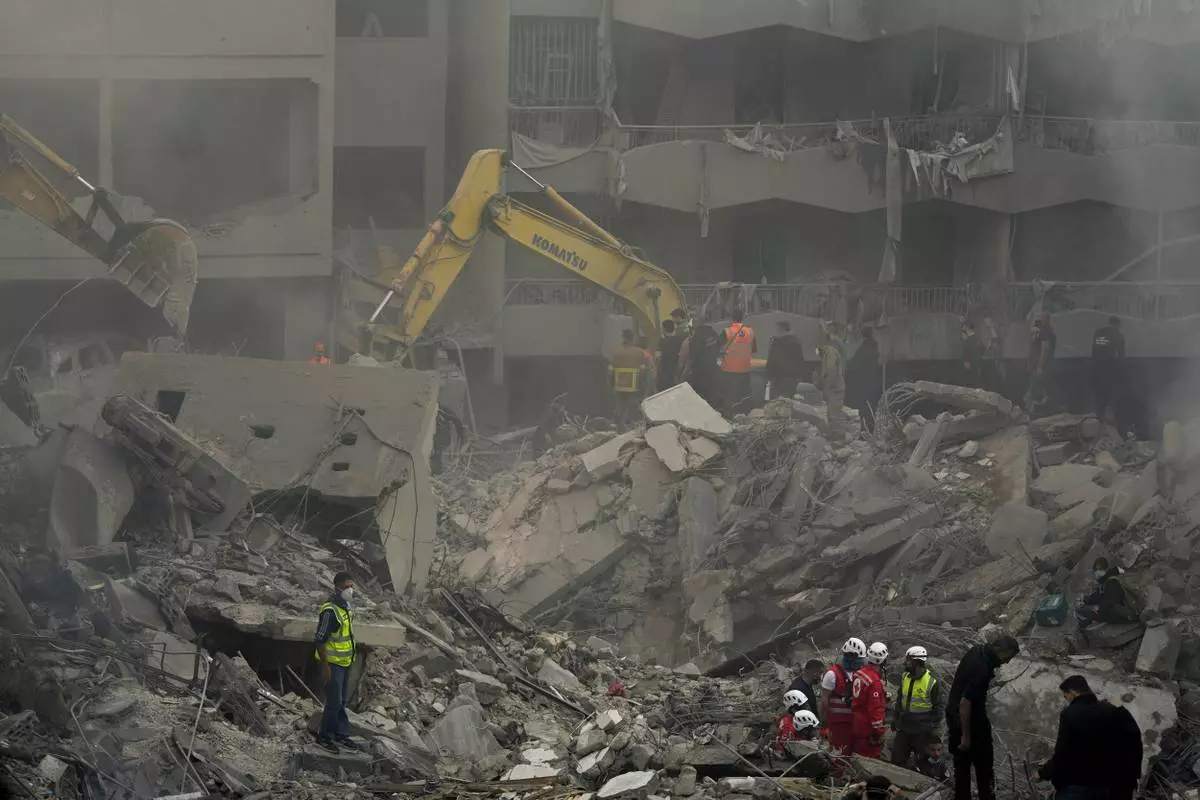
Rescue workers and people search for victims at the site of an Israeli airstrike that hit central Beirut, Lebanon, Saturday, Nov. 23, 2024. (AP Photo/Hassan Ammar)
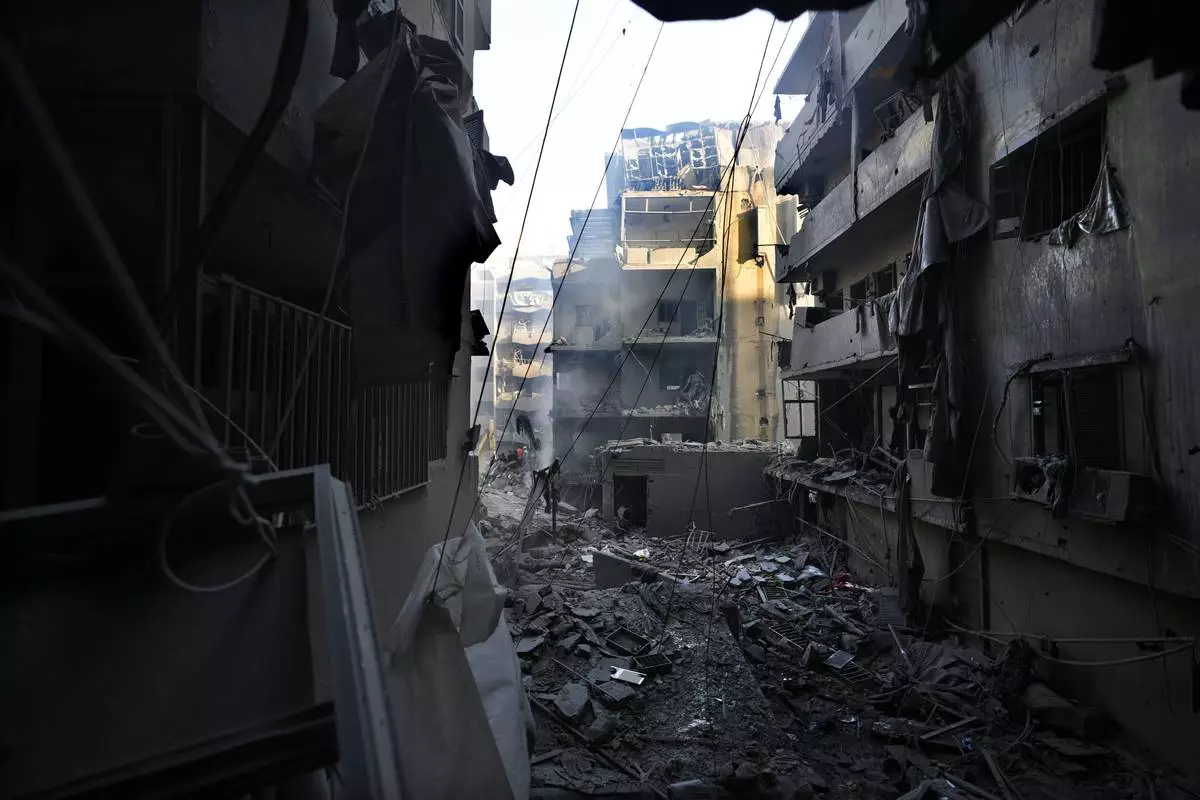
Destroyed buildings are seen at the site of an Israeli airstrike that hit central Beirut, Lebanon, Saturday, Nov. 23, 2024. (AP Photo/Hassan Ammar)
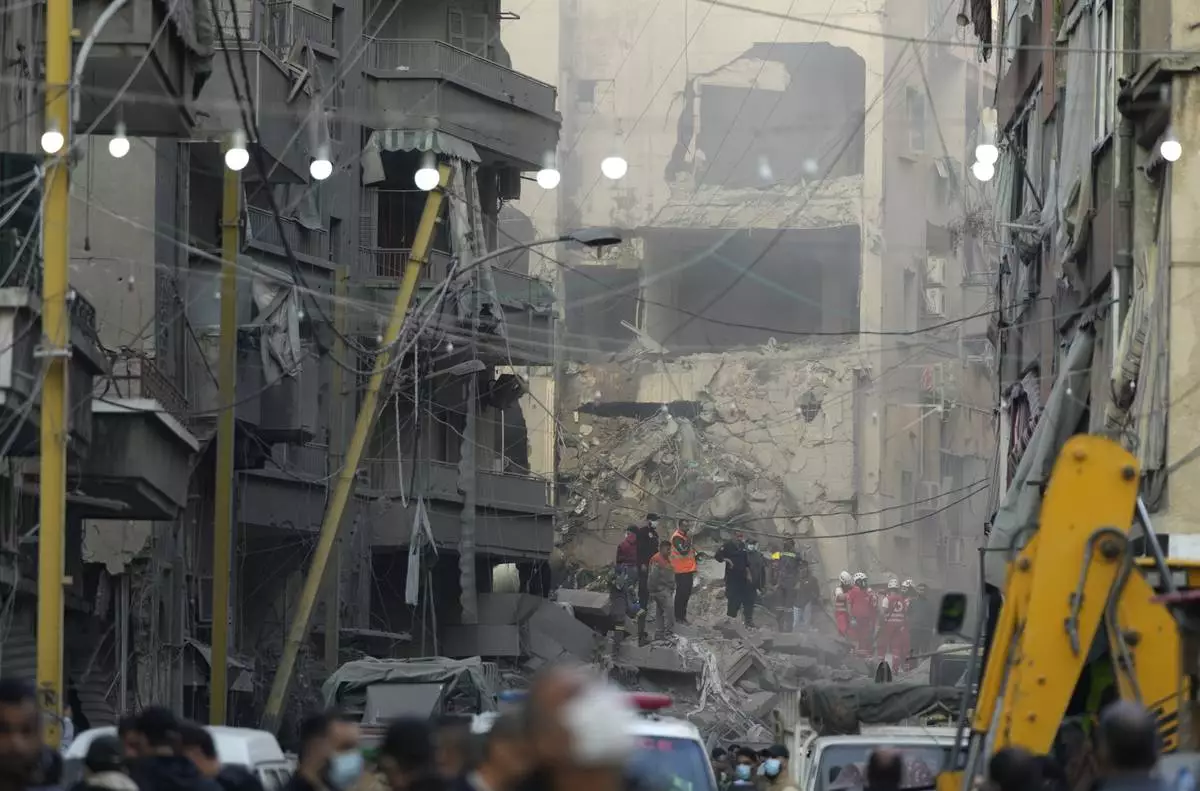
Rescue workers and people gather at the site of an Israeli airstrike that hit central Beirut, Lebanon, Saturday, Nov. 23, 2024. (AP Photo/Hassan Ammar)
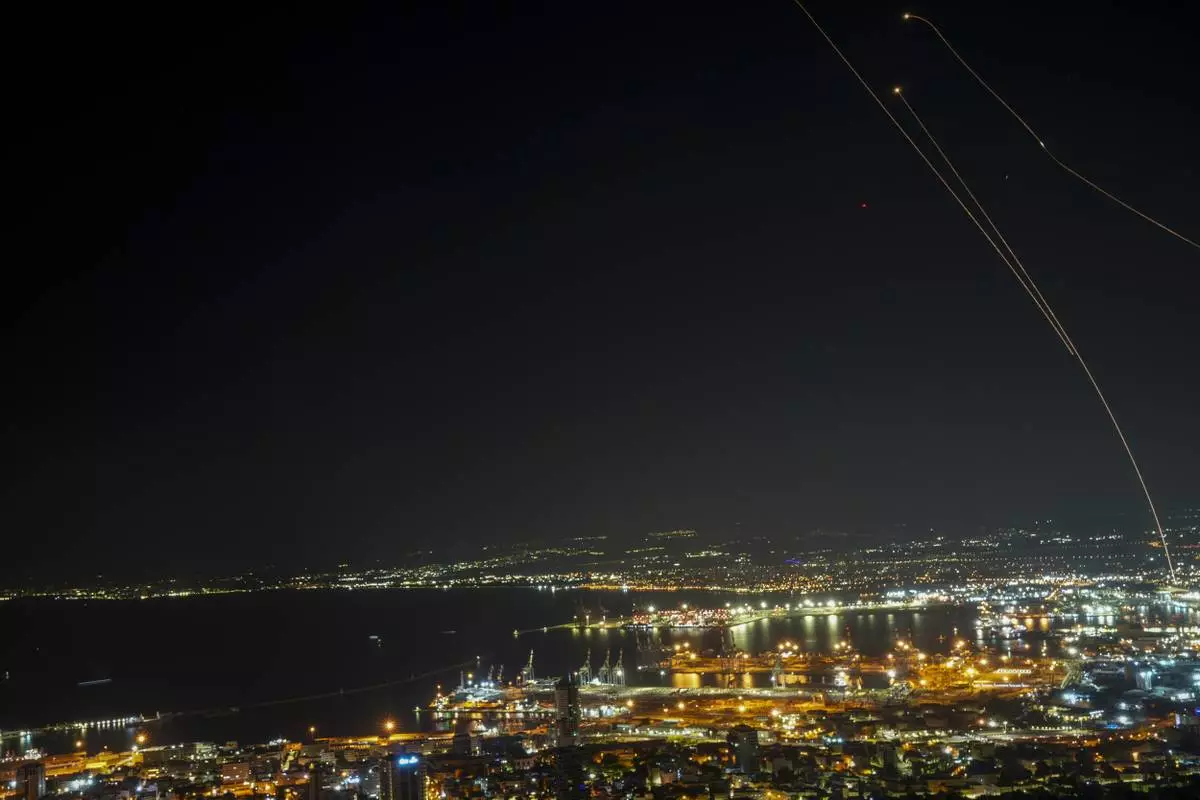
Israeli Iron Dome air defense system fires to intercept rockets that were launched from Lebanon, as seen from Haifa, northern Israel, early Saturday, Nov. 23, 2024. (AP Photo/Francisco Seco)
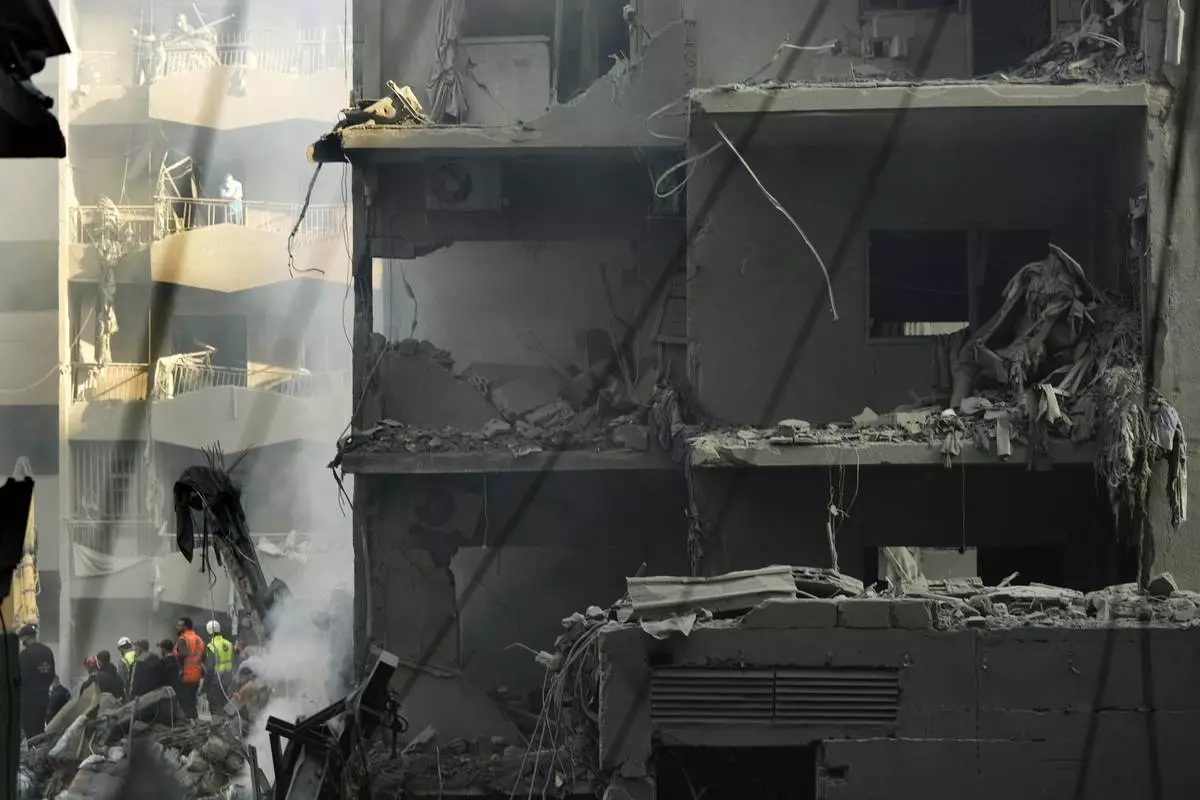
Rescue workers and people gather at the site of an Israeli airstrike that hit central Beirut, Lebanon, Saturday, Nov. 23, 2024. (AP Photo/Hassan Ammar)
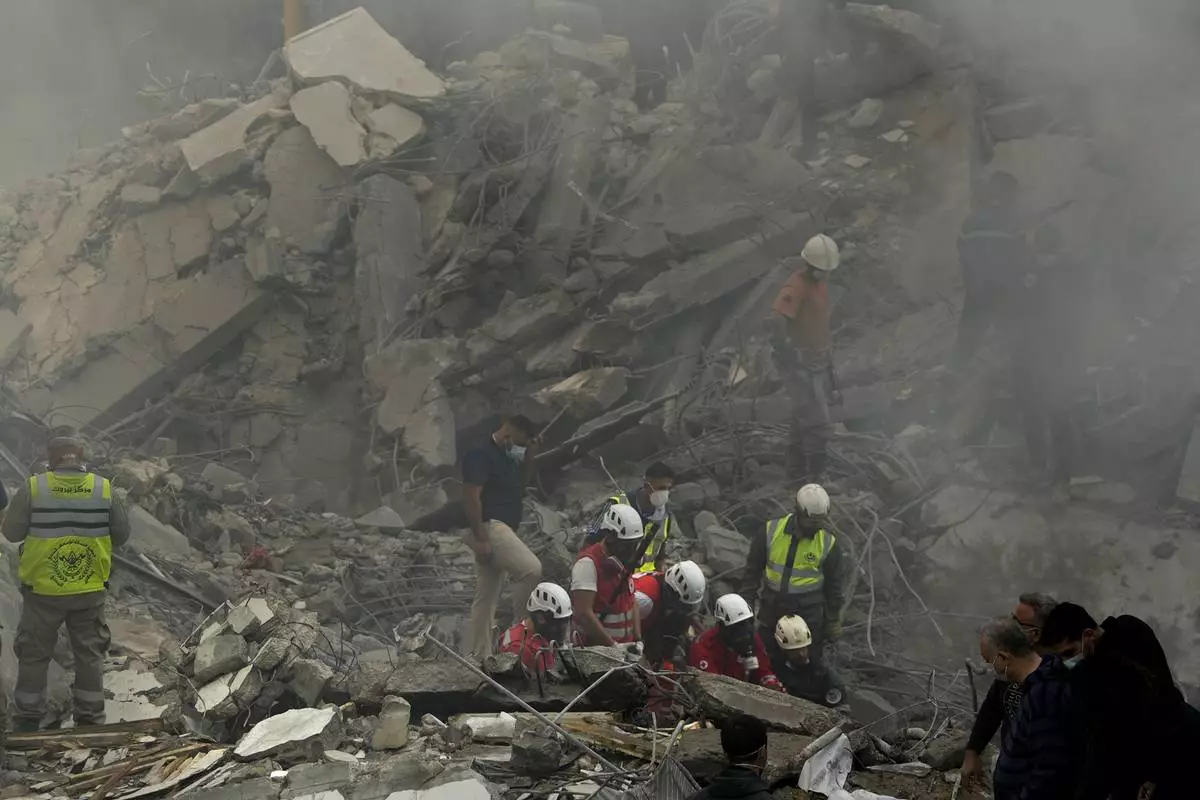
Rescue workers and people search for victims at the site of an Israeli airstrike that hit central Beirut, Lebanon, Saturday, Nov. 23, 2024. (AP Photo/Hassan Ammar)
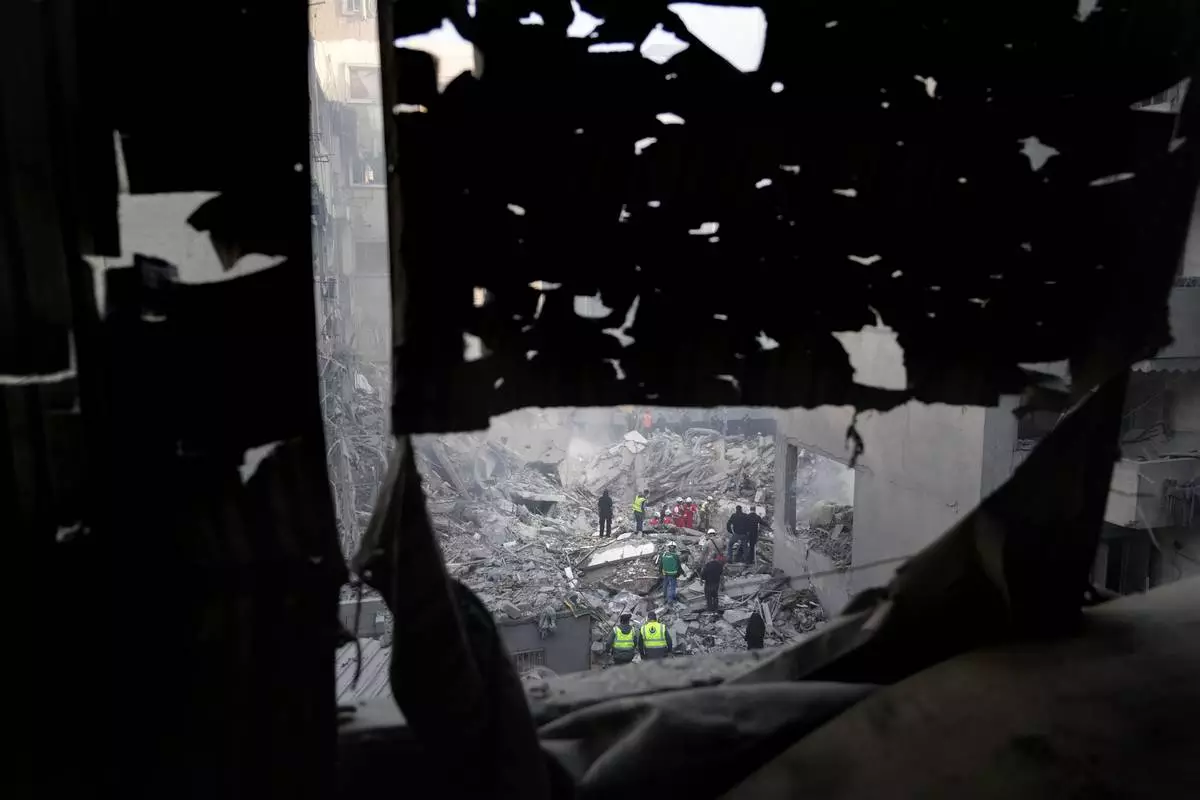
Rescue workers and people search for victims at the site of an Israeli airstrike that hit central Beirut, Lebanon, Saturday, Nov. 23, 2024. (AP Photo/Hassan Ammar)
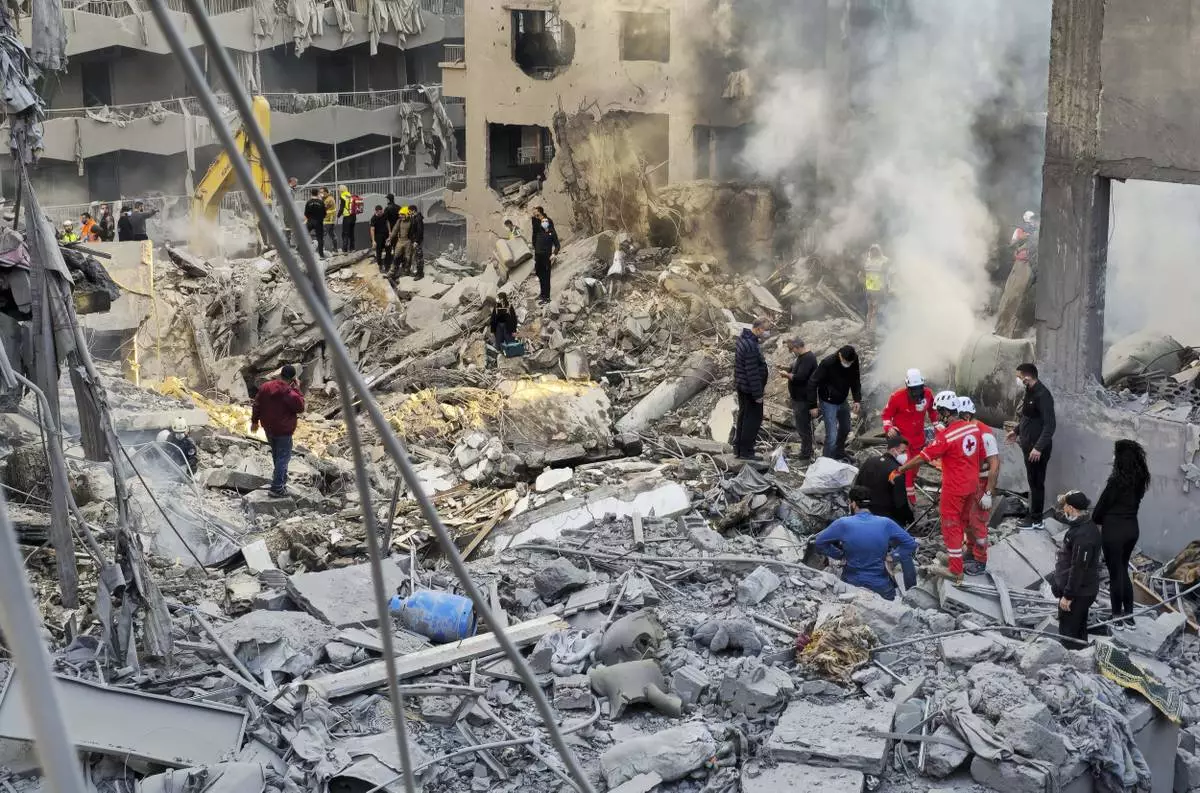
Rescue workers and people search for victims at the site of an Israeli airstrike that hit central Beirut, Lebanon, Saturday, Nov. 23, 2024. (AP Photo/Hassan Ammar)
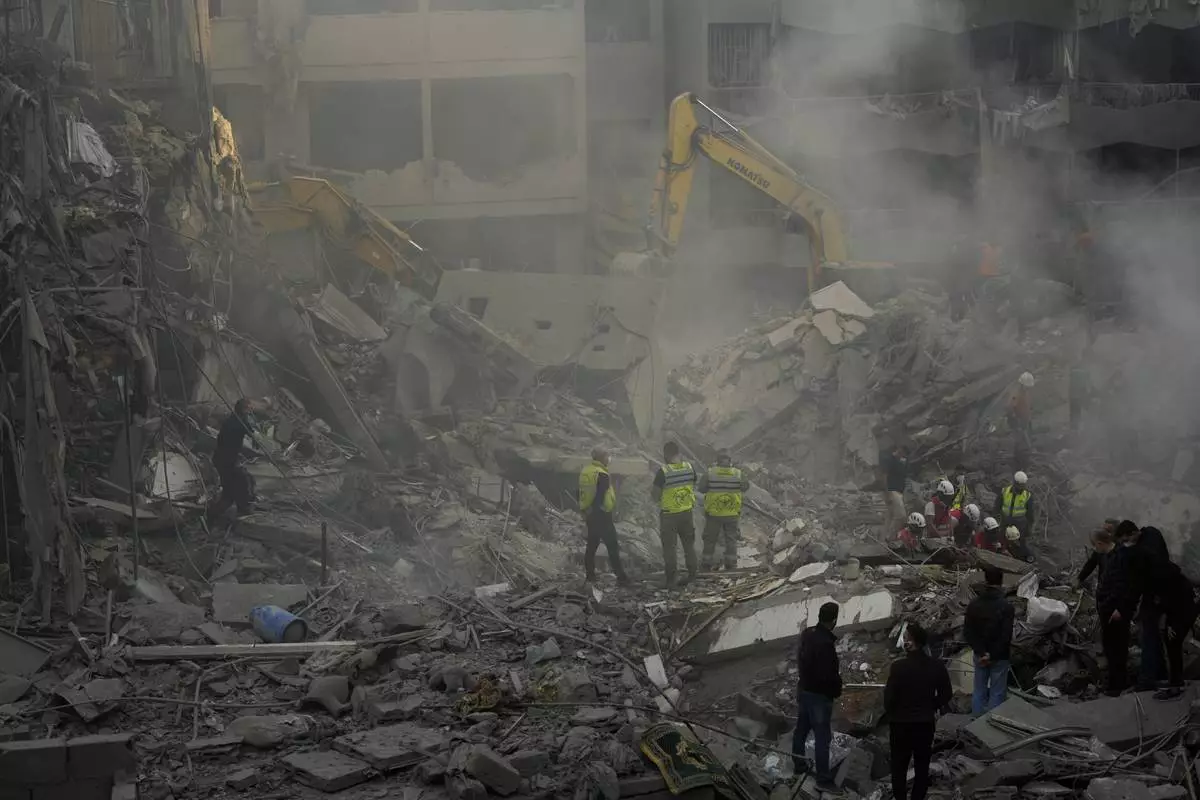
Rescue workers and people search for victims at the site of an Israeli airstrike that hit central Beirut, Lebanon, Saturday, Nov. 23, 2024. (AP Photo/Hassan Ammar)
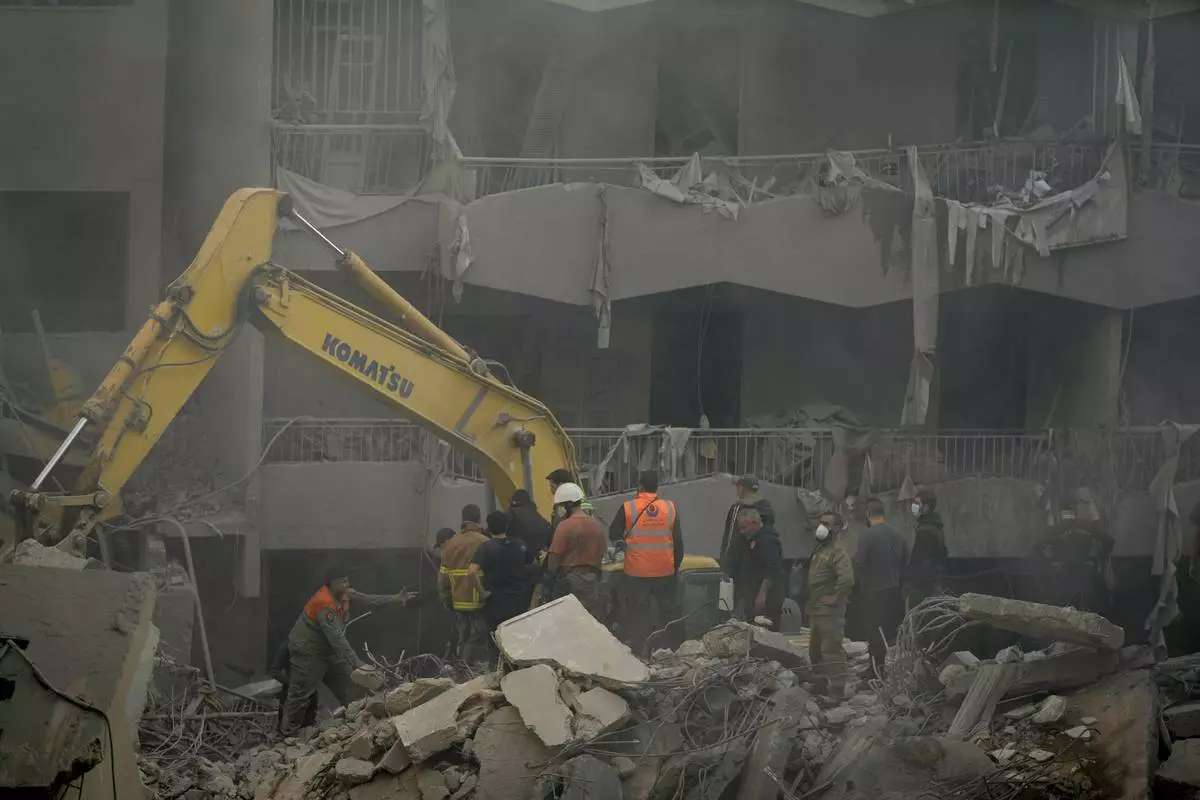
Rescue workers and people search for victims at the site of an Israeli airstrike that hit central Beirut, Lebanon, Saturday, Nov. 23, 2024. (AP Photo/Hassan Ammar)
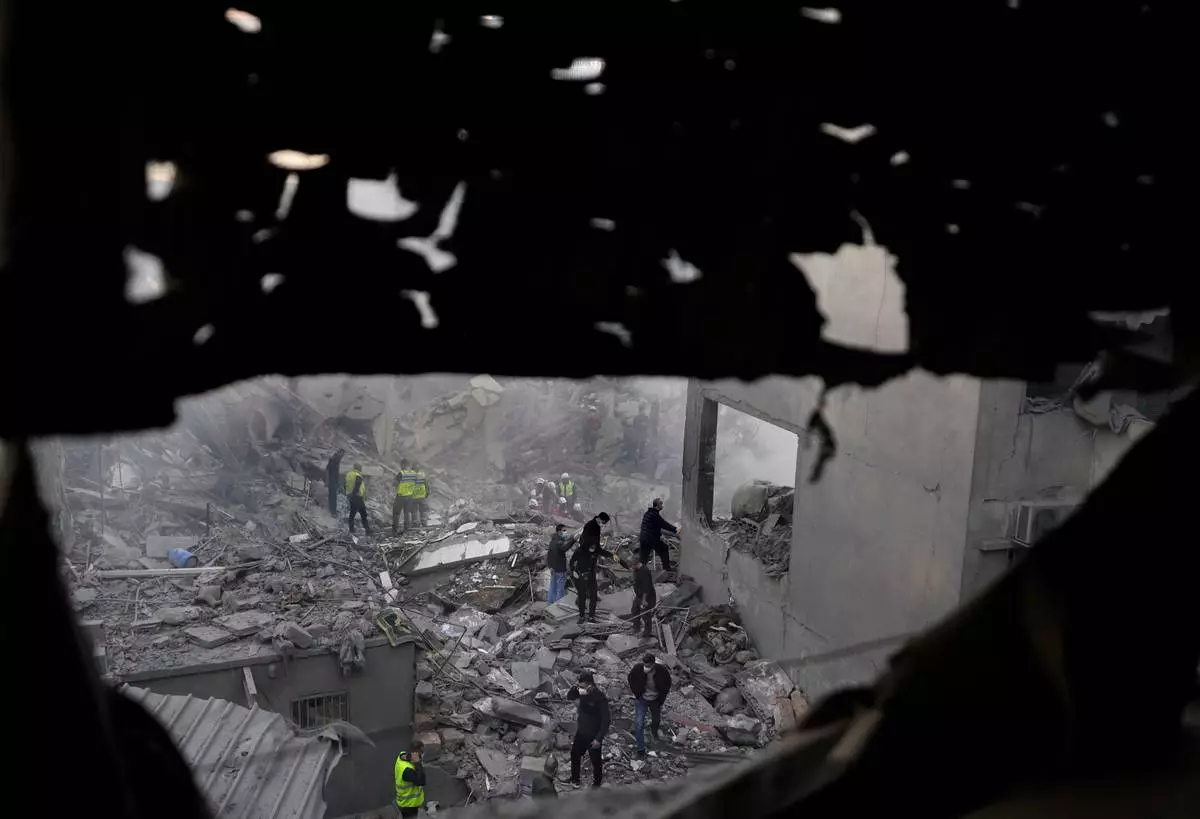
Rescue workers and people search for victims at the site of an Israeli airstrike that hit central Beirut, Lebanon, Saturday, Nov. 23, 2024. (AP Photo/Hassan Ammar)
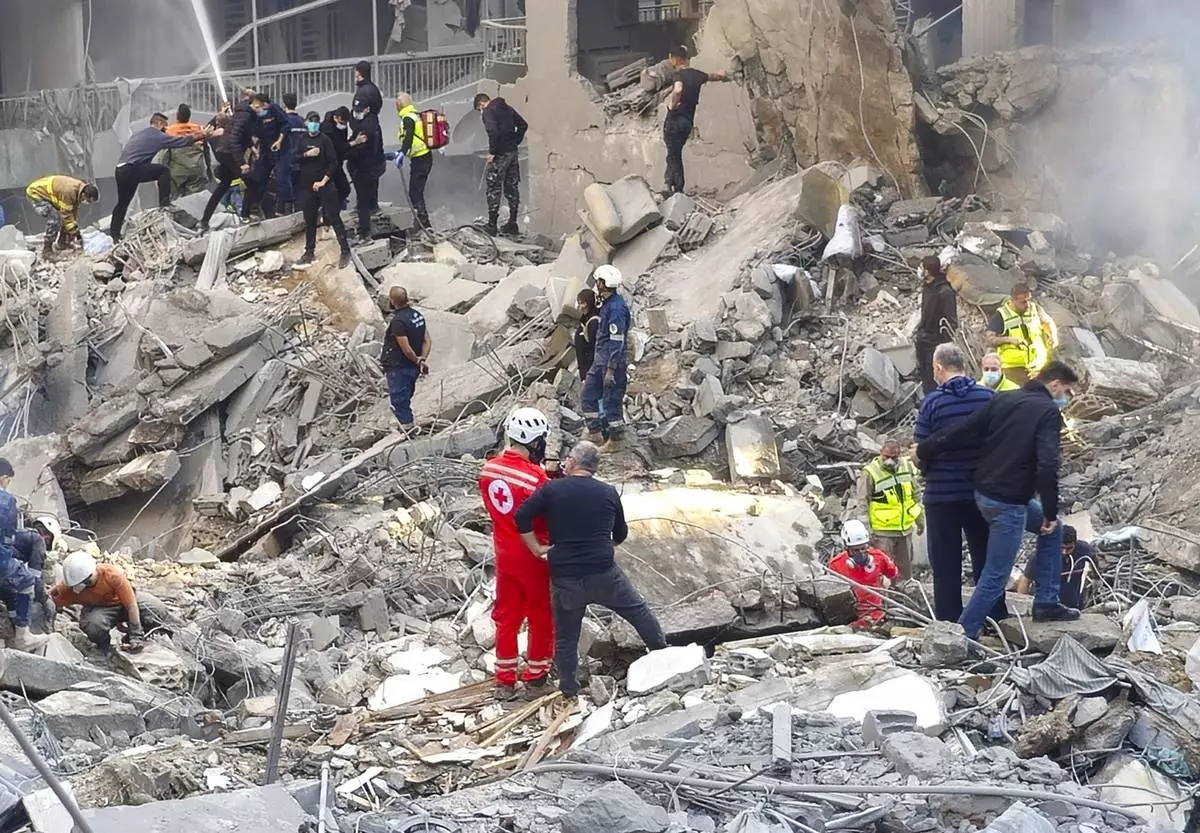
Rescue workers and people search for victims at the site of an Israeli airstrike that hit central Beirut, Lebanon, Saturday, Nov. 23, 2024. (AP Photo/Hassan Ammar)
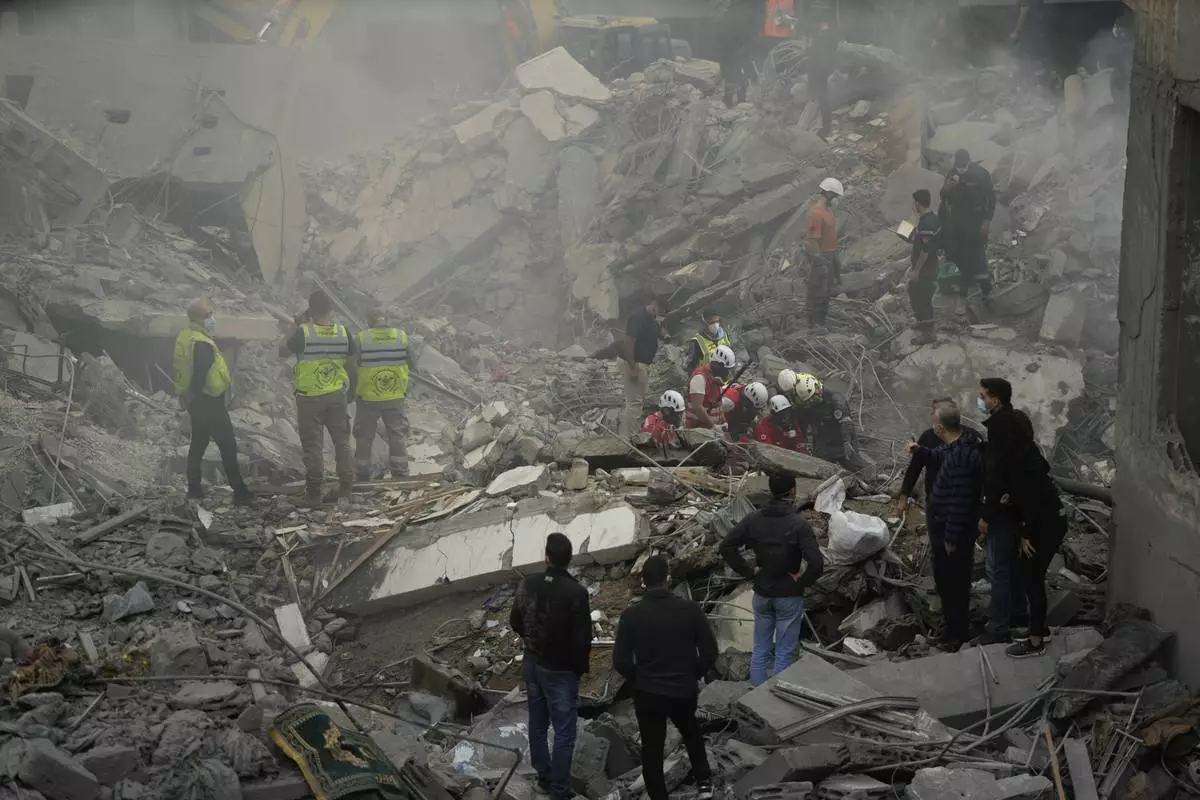
Rescue workers and people search for victims at the site of an Israeli airstrike that hit central Beirut, Lebanon, Saturday, Nov. 23, 2024. (AP Photo/Hassan Ammar)






